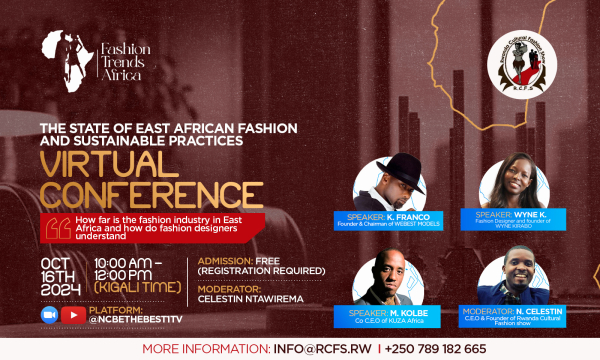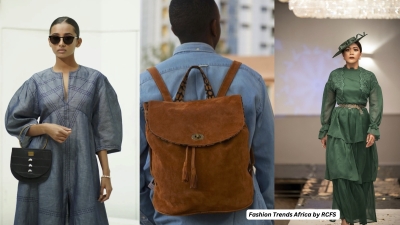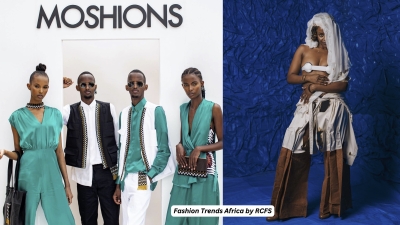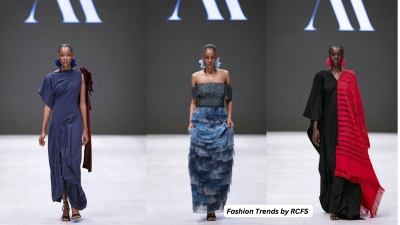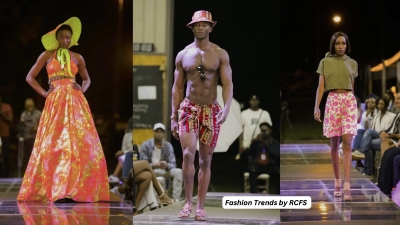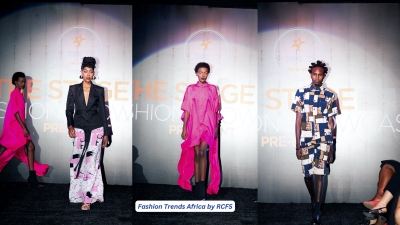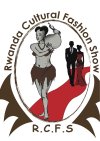
RCFS
The Stage Fashion Showcase 2024 Pre-Event Highlights Emerging and Established Talents: Main Event Set for November 1
The fashion scene in Kigali is abuzz with excitement as preparations for the Stage Fashion Showcase 2024 2nd edition are in full swing. The recent pre-event, inspired by the All Black Party theme, offered a tantalizing glimpse of what's to come, featuring collections from various local fashion designers and attracting numerous fashion enthusiasts.
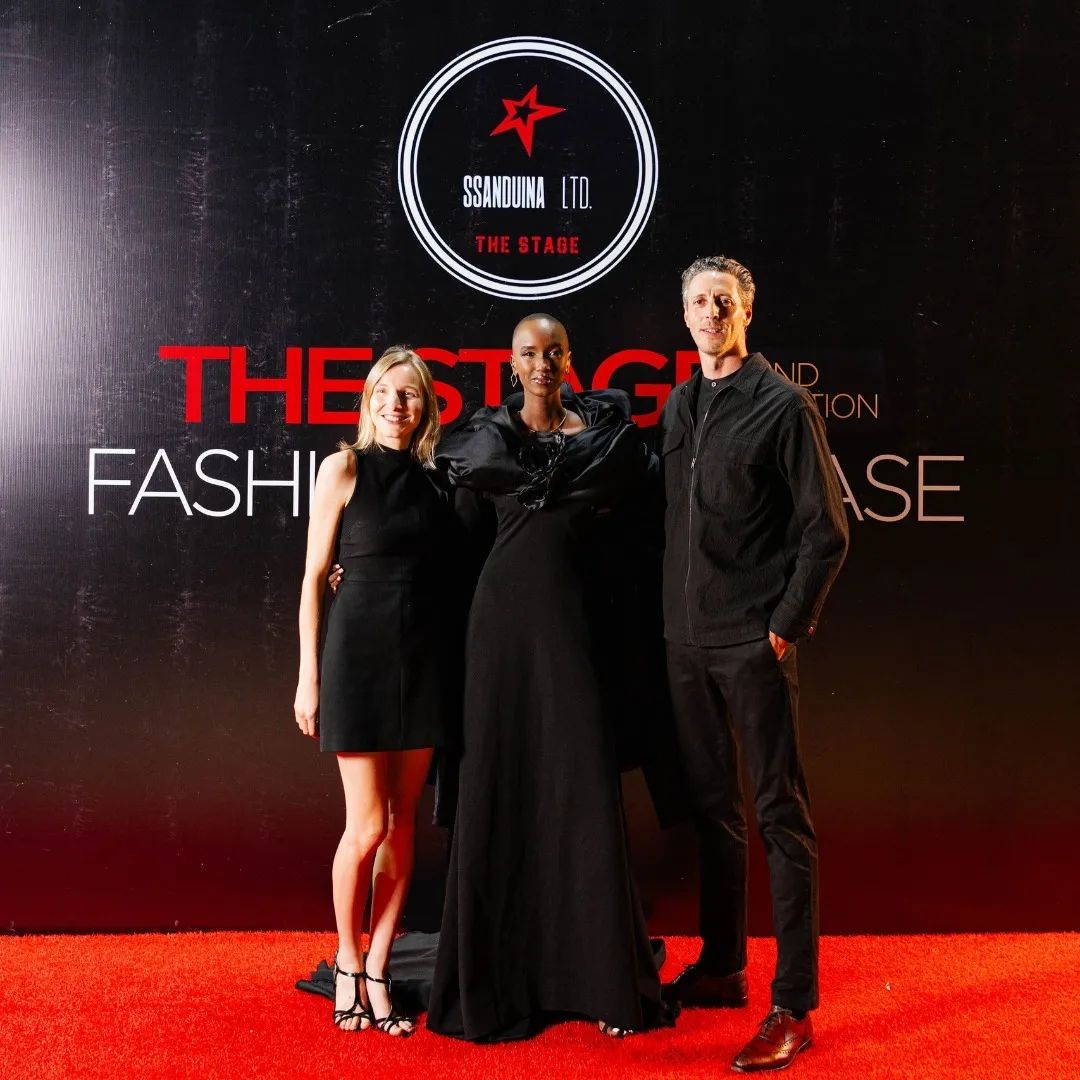 In the photo, Standing in between is Model Sandrine Mucyo CEO and Manager of the Stage Fashion Showcase, Pre-event in Kigali [Photo Credit: SFS]
In the photo, Standing in between is Model Sandrine Mucyo CEO and Manager of the Stage Fashion Showcase, Pre-event in Kigali [Photo Credit: SFS]
Organized by supermodel Sandrine Mucyo through her company Ssanduina LTD, the pre-event took place on October 16, 2024, at Institut Français, Kigali. The location choice proved strategic, as it allowed for free entry, making the event accessible to a wider audience. Mucyo, who manages the showcase, announced that the main event is scheduled for November 1, 2024, at Mundi Center in the heart of Kigali.
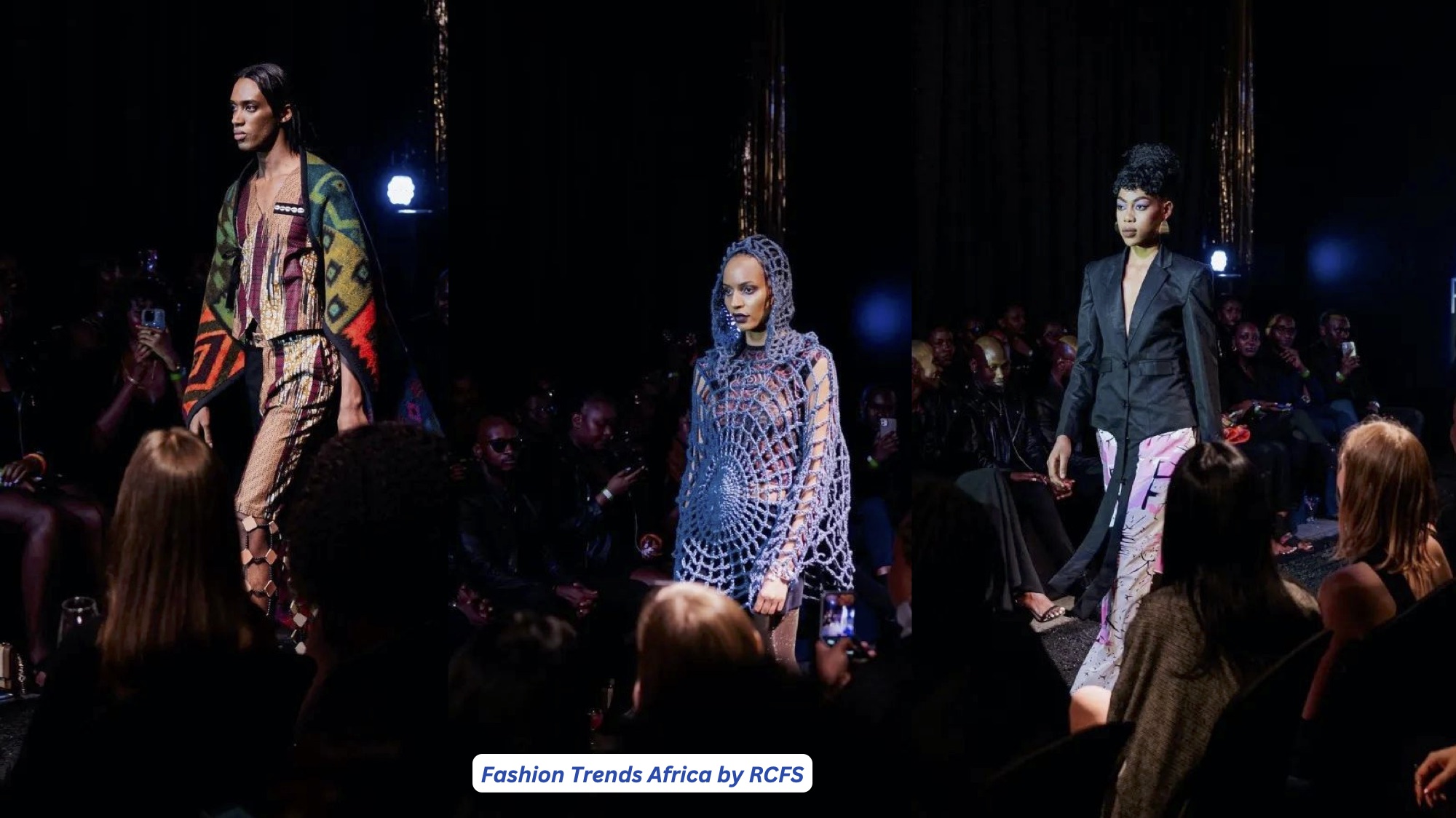 Pre-event of the Stage Fashion Showcase 2024, 2nd Edition, in Kigali [Photo Credit: SFS]
Pre-event of the Stage Fashion Showcase 2024, 2nd Edition, in Kigali [Photo Credit: SFS]
The pre-event was a dazzling affair, with attendees donning elegant black outfits in keeping with the theme. It brought together a diverse group of local fashion designers who showcased their collections before an audience of industry luminaries and special guests. Notable attendees included Kabano Franco, Isimbi Model, DJ Lamper, Boukuru, Sekamana Eric, and Matilda Mangeot, the show's cultural and communication officer. The event also saw the participation of international model Eveline Gonzenbach, alongside Trevor and managers from local modeling agencies.
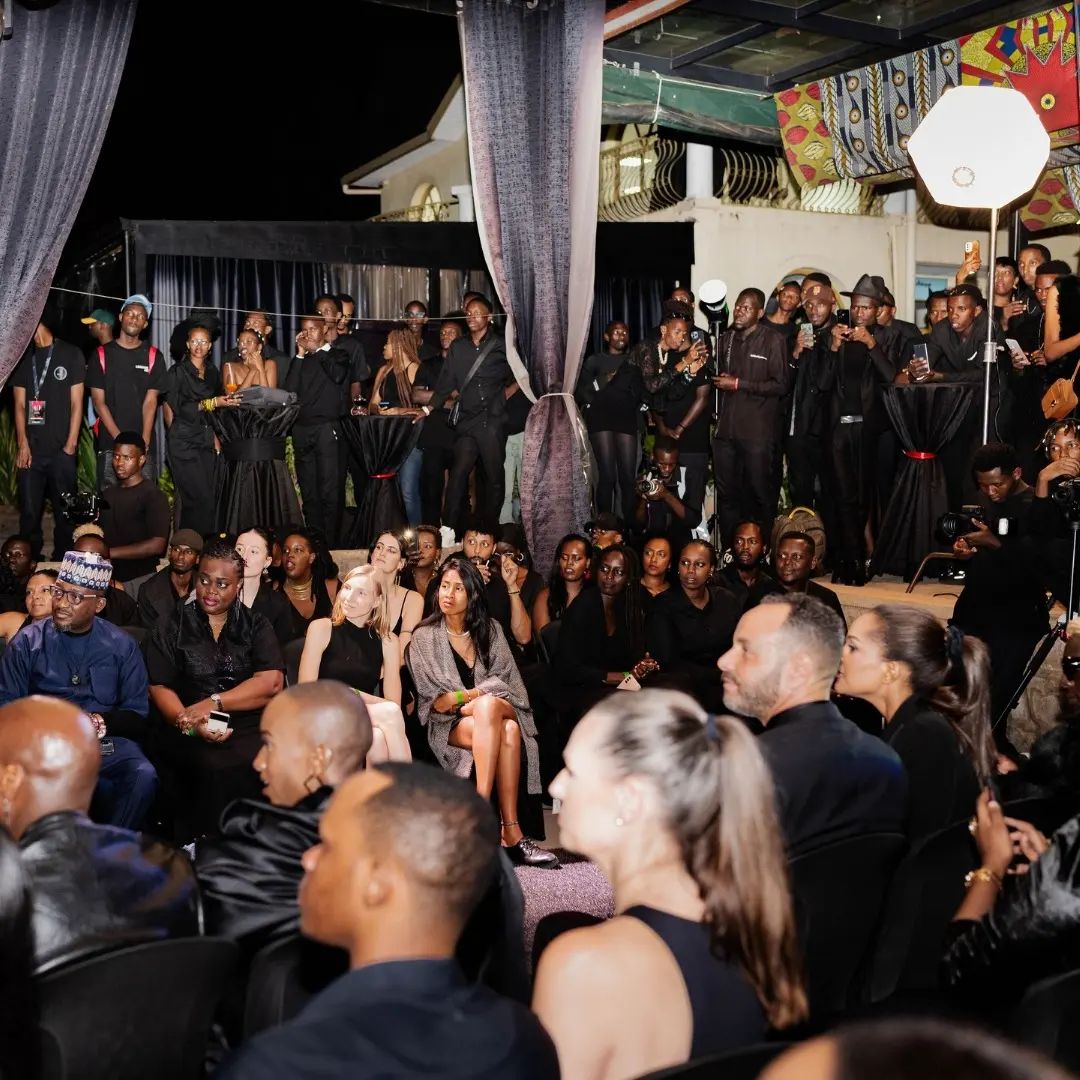 Pre-event of the Stage Fashion Showcase 2024, 2nd Edition, in Kigali [Photo Credit: SFS]
Pre-event of the Stage Fashion Showcase 2024, 2nd Edition, in Kigali [Photo Credit: SFS]
Several designers presented their work, each bringing a unique perspective to the runway. Promesse House of Collection, Lisa Crochet with her Glory Winter collection, and Era Crown with a 90s-to-50s-inspired collection were among the highlights. SA Fashion Collection and Maurice Matheo also showcased their latest designs, adding to the diverse array of styles on display.
 Pre-event of the Stage Fashion Showcase 2024, 2nd Edition, in Kigali [Photo Credit: SFS]
Pre-event of the Stage Fashion Showcase 2024, 2nd Edition, in Kigali [Photo Credit: SFS]
The success of the pre-event has set high expectations for the main show. With its focus on celebrating culture, heritage, creativity, and talent within the Rwandan fashion industry, the Stage Fashion Showcase 2024 promises to be a landmark event. The organizers have clearly invested significantly in branding and preparation, as evident from the polished execution of the pre-event.
 Pre-event of the Stage Fashion Showcase 2024, 2nd Edition, in Kigali [Photo Credit: SFS]
Pre-event of the Stage Fashion Showcase 2024, 2nd Edition, in Kigali [Photo Credit: SFS]
However, amidst the excitement, some challenges facing the Rwandan fashion industry were brought to light. During the event, guests of honor highlighted issues such as the scarcity of fashion shows for models to showcase their talents. One guest emphasized the need for investors to support models and the fashion industry at large, underscoring the importance of financial backing for sustained growth.
The Stage Fashion Showcase stands out as currently the only major fashion show event running in Rwanda, raising questions about its capacity to satisfy the numerous models seeking runway opportunities. This scarcity of platforms highlights the potential for growth in the Rwandan fashion scene and the need for more such events to nurture local talent.
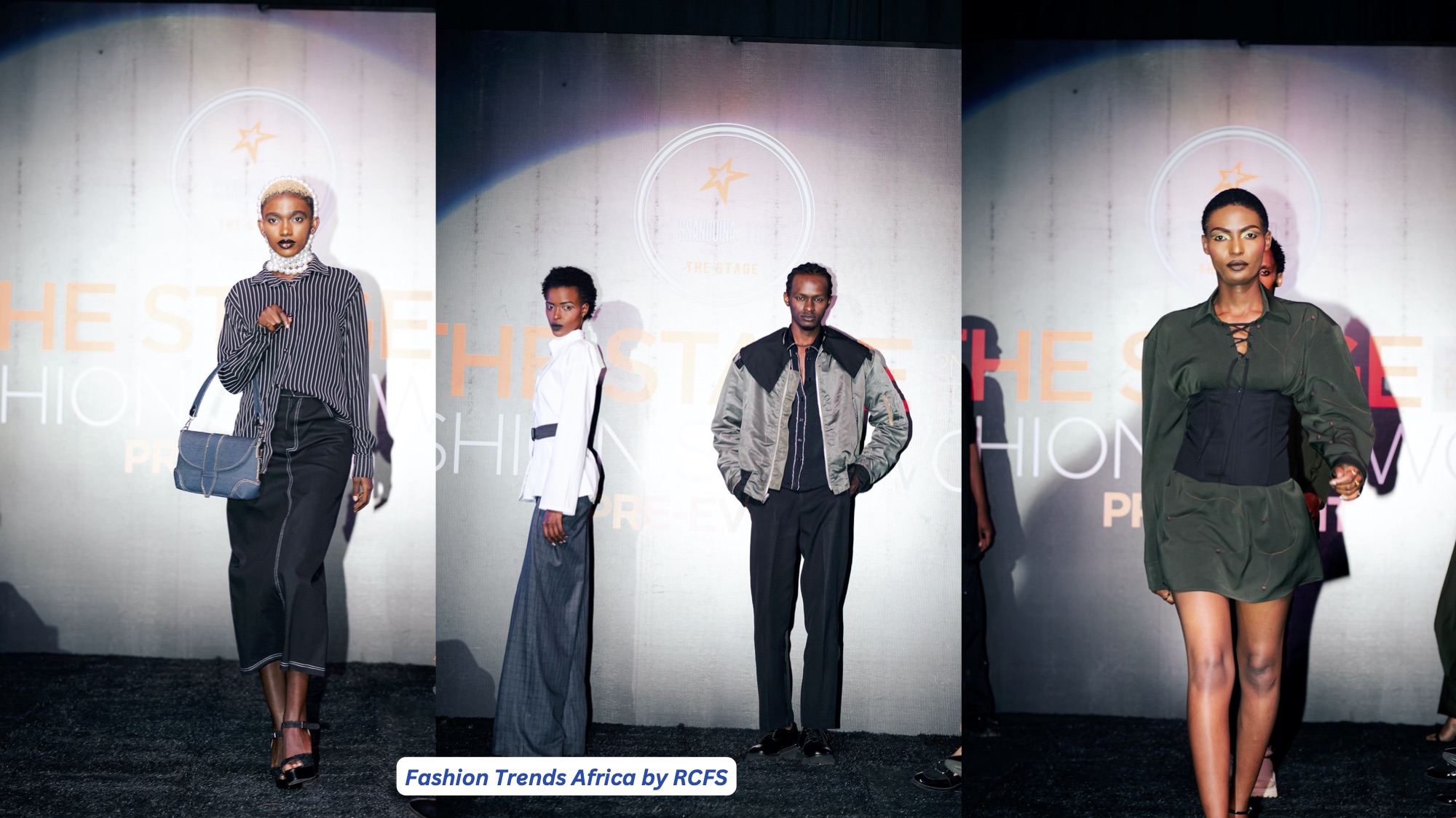 Pre-event of the Stage Fashion Showcase 2024, 2nd Editio, in Kigali [Photo Credit: SFS]
Pre-event of the Stage Fashion Showcase 2024, 2nd Editio, in Kigali [Photo Credit: SFS]
Looking ahead to the main event on November 1, fashion enthusiasts and lovers in Kigali are eagerly anticipating what promises to be a mind-blowing showcase. The organizers are pulling out all the stops, with plans to involve big names and influencers in this year's event. The choice of Mundi Center as the venue places the showcase at the epicenter of Kigali's vibrant culture.
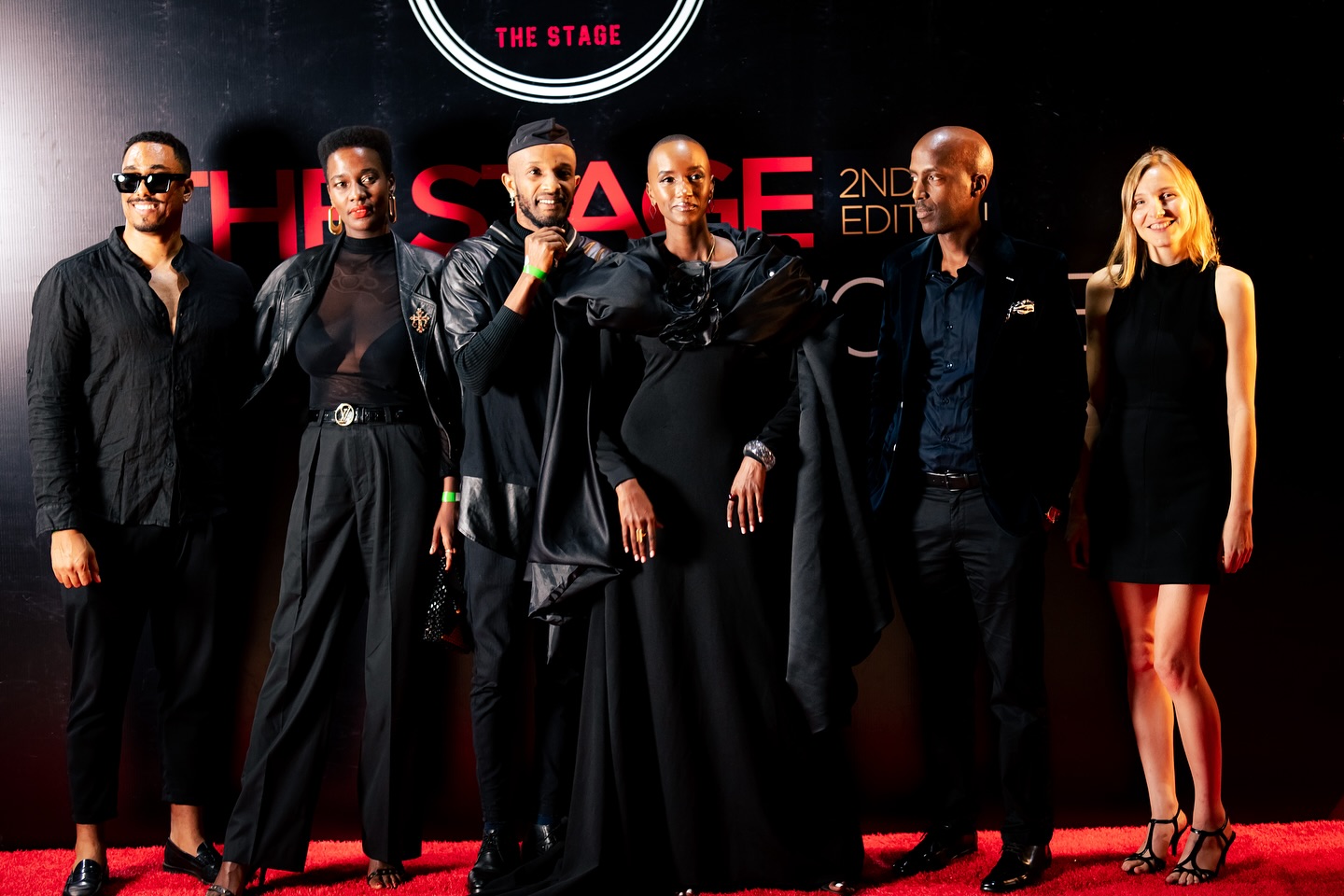 Pre-event of the Stage Fashion Showcase 2024, 2nd Edition, in Kigali [Photo Credit: SFS]
Pre-event of the Stage Fashion Showcase 2024, 2nd Edition, in Kigali [Photo Credit: SFS]
Model Sandrine Mucyo, founder and manager of the Stage Fashion Showcase, has already confirmed a select team to brand, support, and promote the 2nd edition. This team includes familiar faces from the pre-event such as DJ Lamper, Kabano Franco, Joxk Parker, and Isimbi Model, ensuring continuity and building on the momentum generated by the pre-event.
 Tickets on sale for the Stage Fashion Showcase 2024
Tickets on sale for the Stage Fashion Showcase 2024
As the Stage Fashion Showcase 2024 approaches, it carries the weight of expectations not just as a fashion event, but as a pivotal platform for the Rwandan fashion industry. It represents an opportunity to showcase local talent, attract investment, and put Kigali on the global fashion map. The success of this event could pave the way for more frequent and diverse fashion showcases in Rwanda, addressing the current shortage of opportunities for models and designers alike.
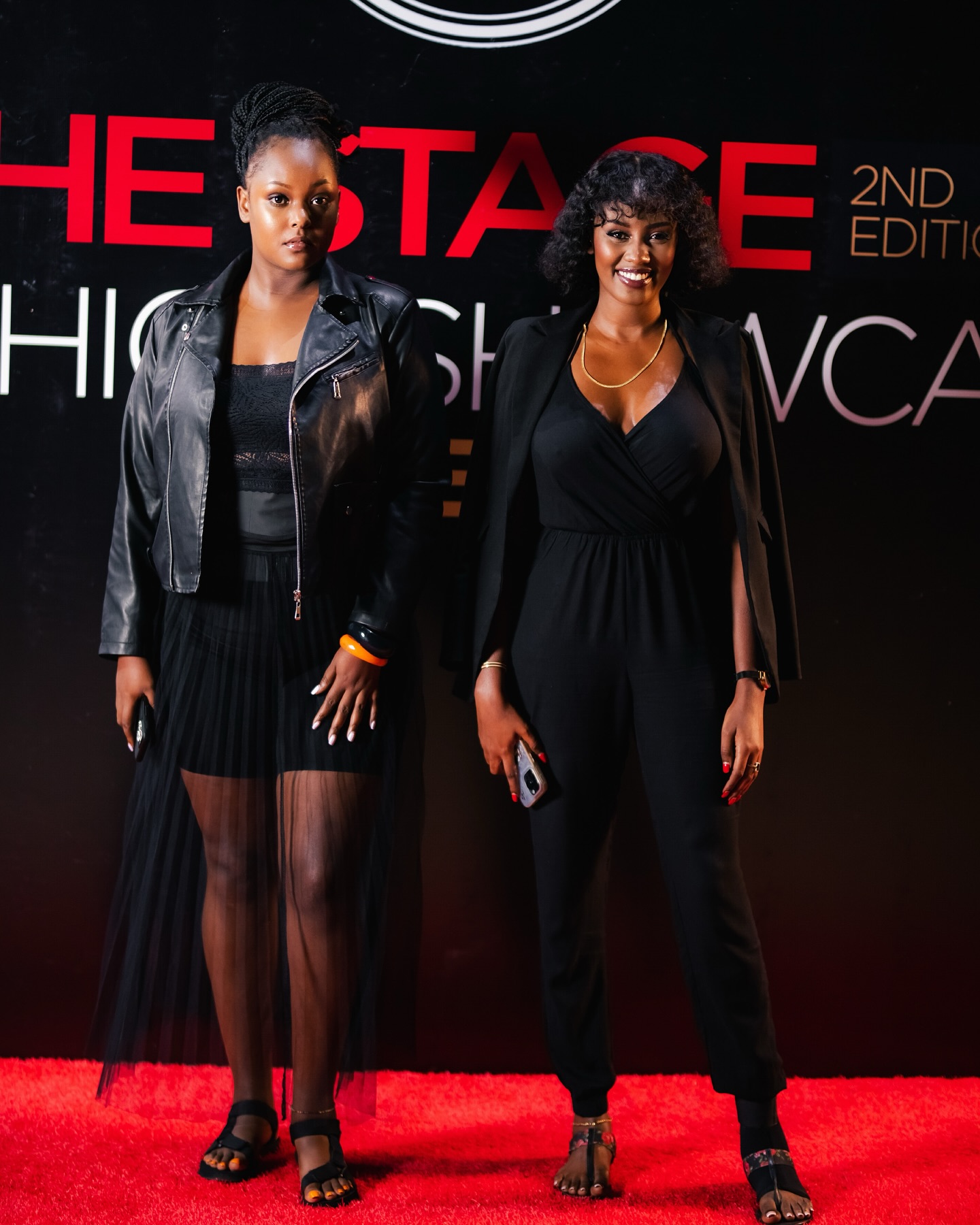 Pre-event of the Stage Fashion Showcase 2024, 2nd Edition, in Kigali [Photo Credit: SFS]
Pre-event of the Stage Fashion Showcase 2024, 2nd Edition, in Kigali [Photo Credit: SFS]
 Pre-event of the Stage Fashion Showcase 2024, 2nd Edition, in Kigali [Photo Credit: SFS]
Pre-event of the Stage Fashion Showcase 2024, 2nd Edition, in Kigali [Photo Credit: SFS]
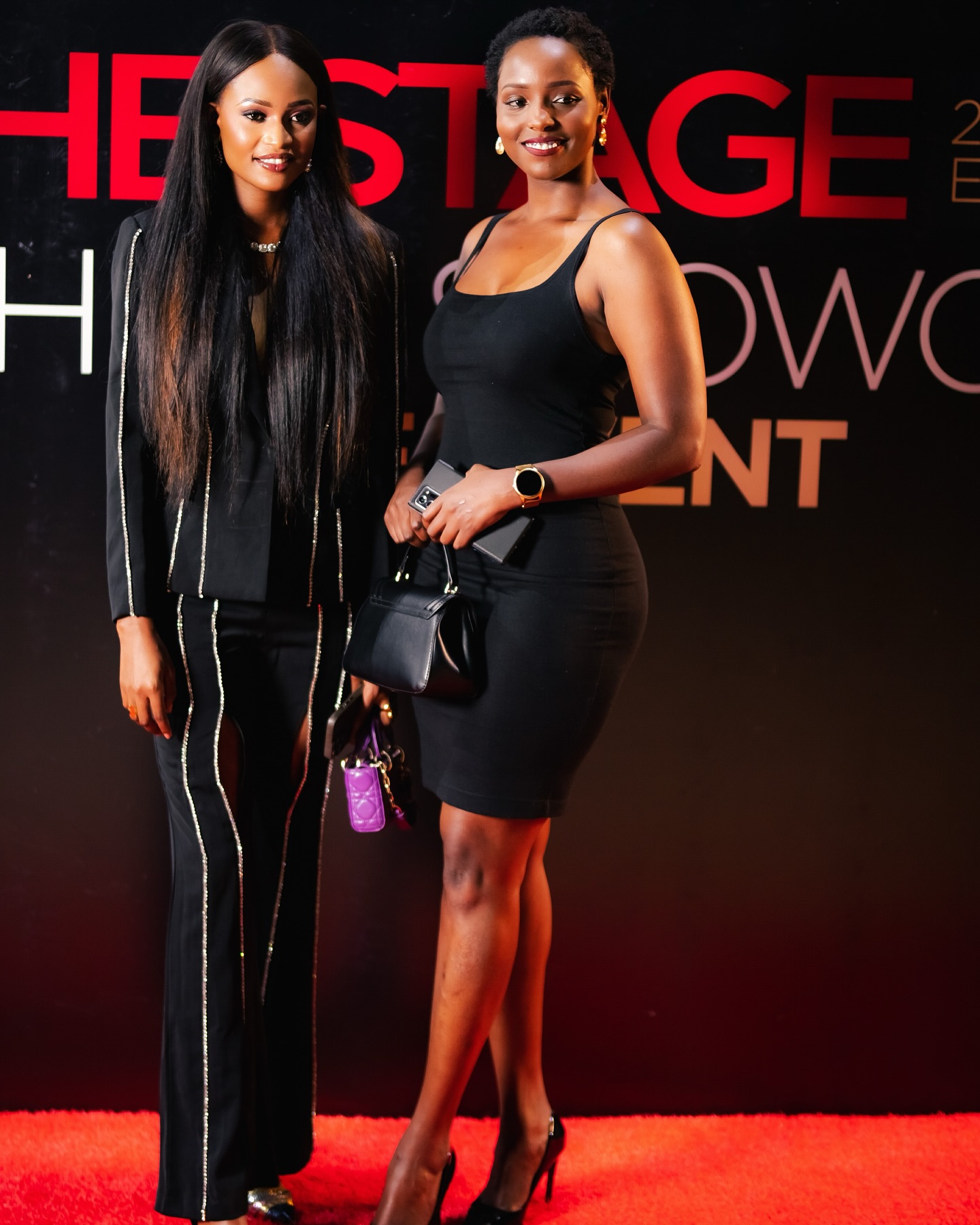 Pre-event of the Stage Fashion Showcase 2024, 2nd Edition, in Kigali [Photo Credit: SFS]
Pre-event of the Stage Fashion Showcase 2024, 2nd Edition, in Kigali [Photo Credit: SFS]
 Pre-event of the Stage Fashion Showcase 2024, 2nd Edition, in Kigali [Photo Credit: SFS]
Pre-event of the Stage Fashion Showcase 2024, 2nd Edition, in Kigali [Photo Credit: SFS]
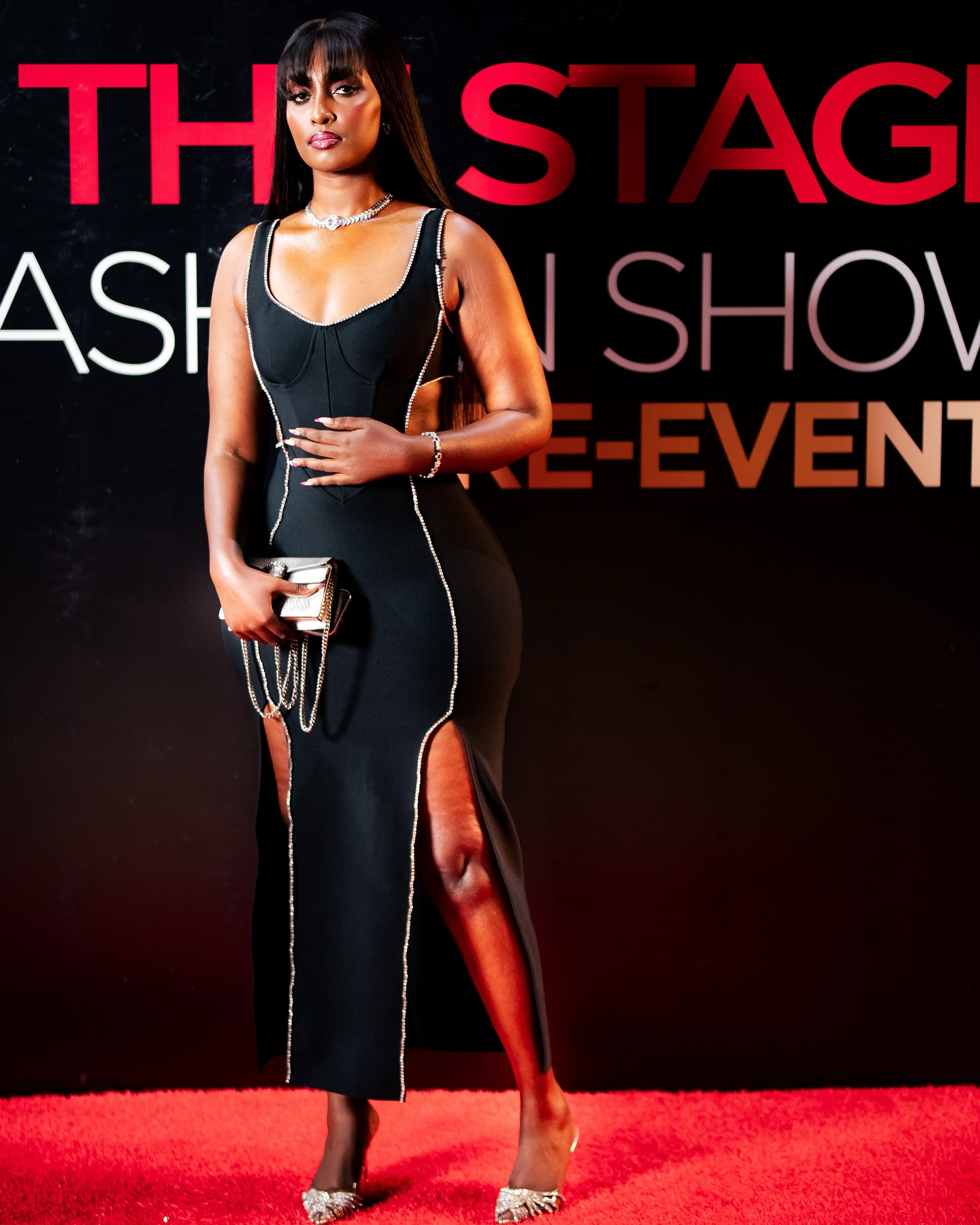 Pre-event of the Stage Fashion Showcase 2024, 2nd Edition, in Kigali [Photo Credit: SFS]
Pre-event of the Stage Fashion Showcase 2024, 2nd Edition, in Kigali [Photo Credit: SFS]
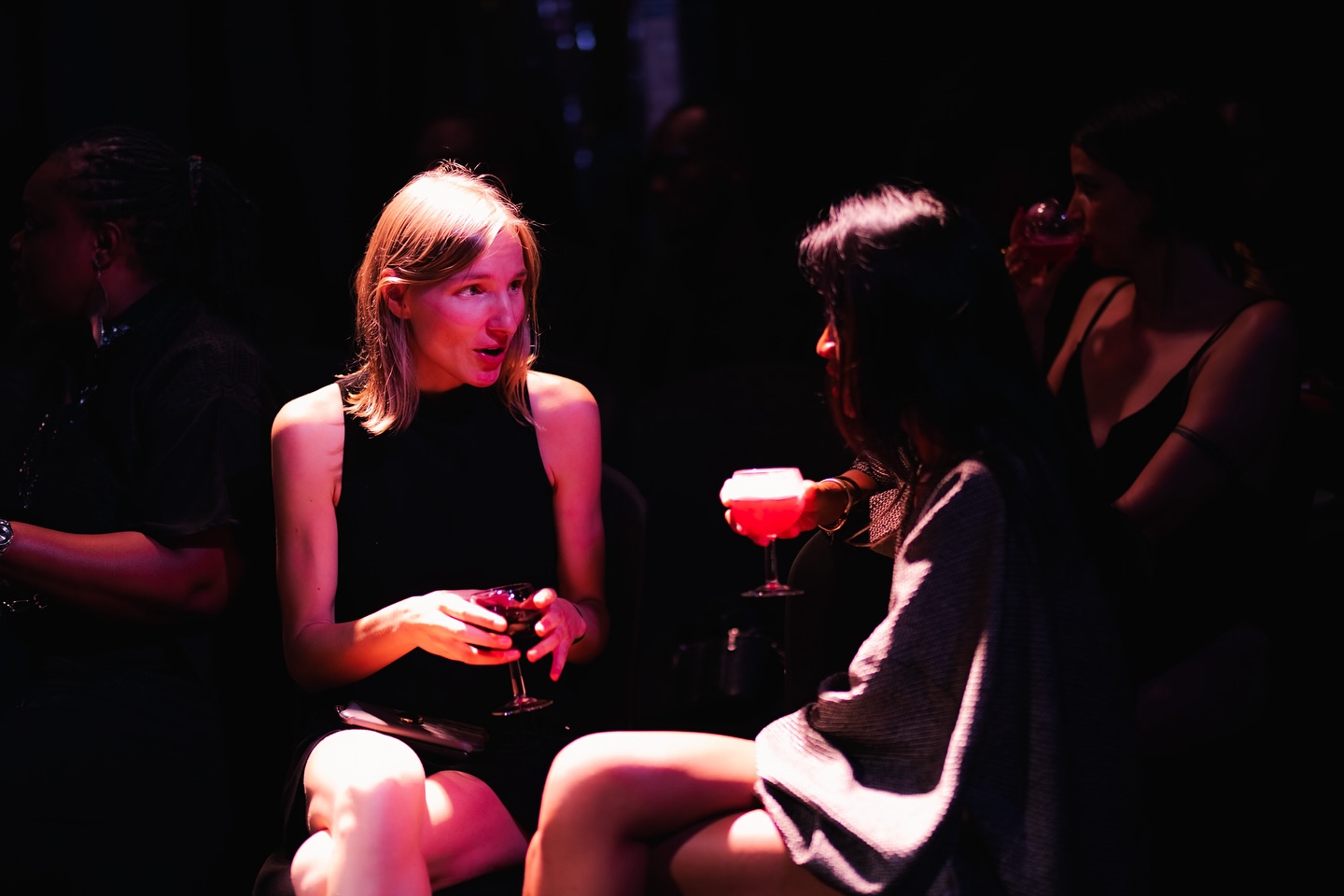 Pre-event of the Stage Fashion Showcase 2024 , 2nd Edition, in Kigali [Photo Credit: SFS]
Pre-event of the Stage Fashion Showcase 2024 , 2nd Edition, in Kigali [Photo Credit: SFS]
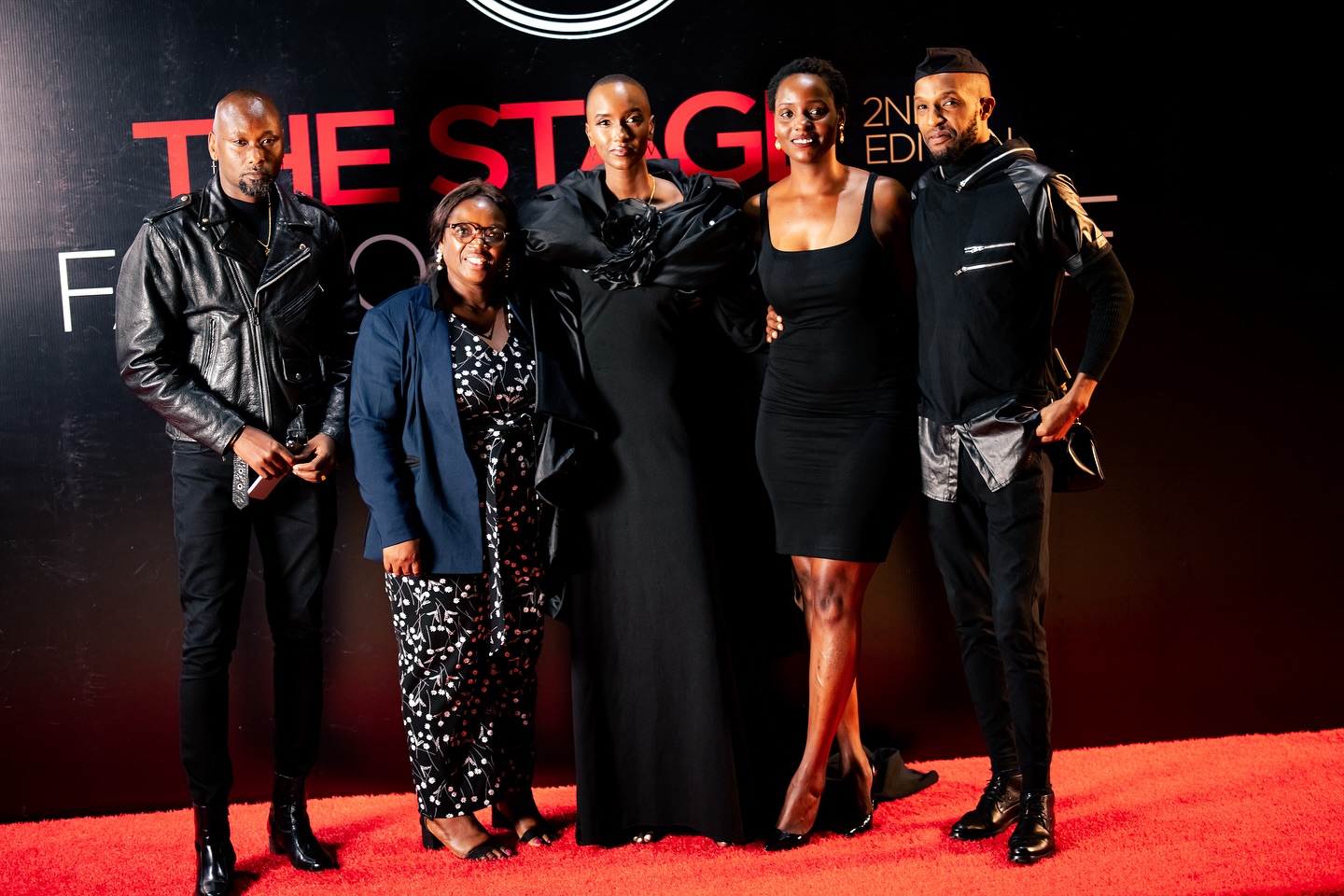 Pre-event of the Stage Fashion Showcase 2024, 2nd Edition, in Kigali [Photo Credit: SFS]
Pre-event of the Stage Fashion Showcase 2024, 2nd Edition, in Kigali [Photo Credit: SFS]
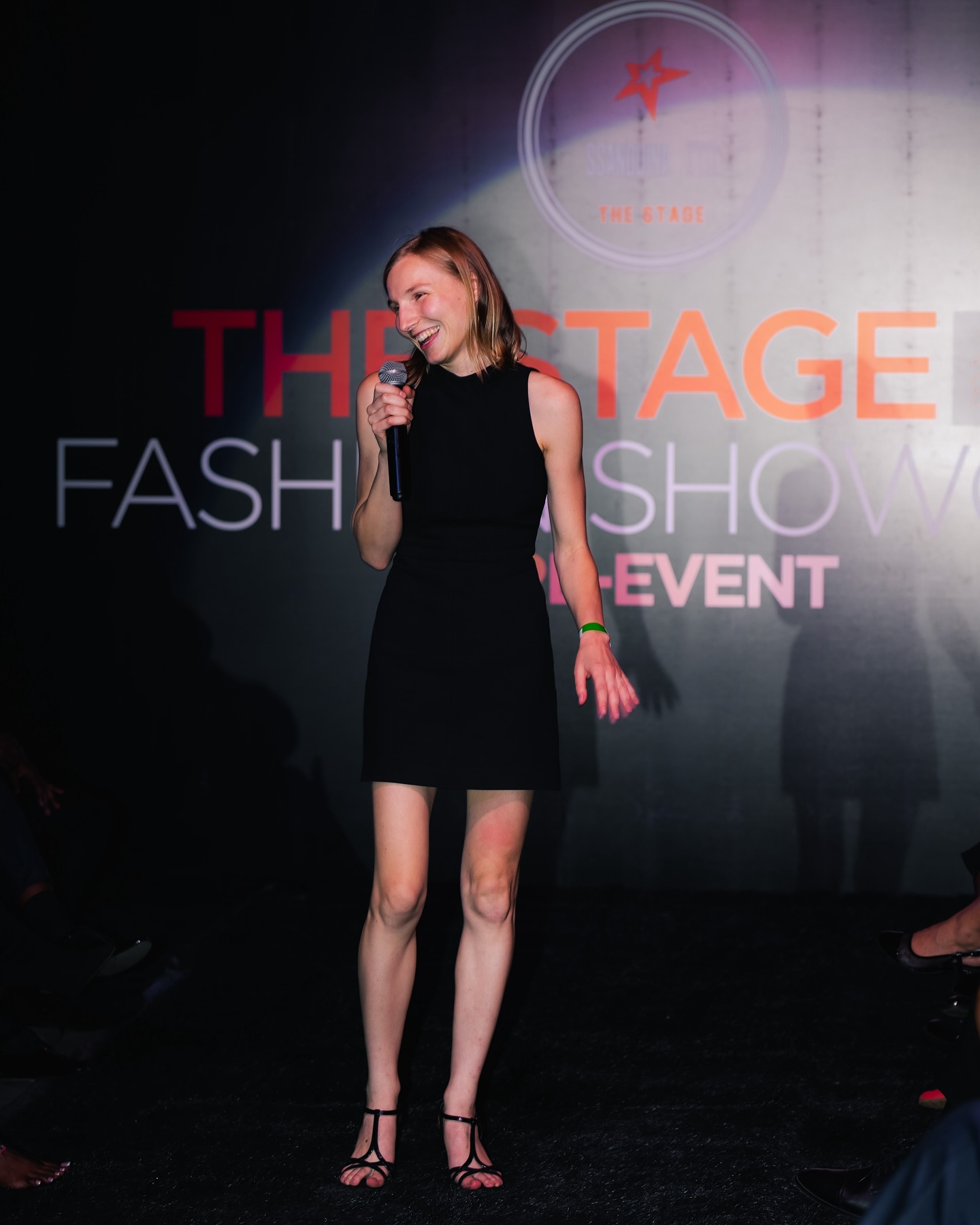 Pre-event of the Stage Fashion Showcase 2024, 2nd Edition, in Kigali [Photo Credit: SFS]
Pre-event of the Stage Fashion Showcase 2024, 2nd Edition, in Kigali [Photo Credit: SFS]
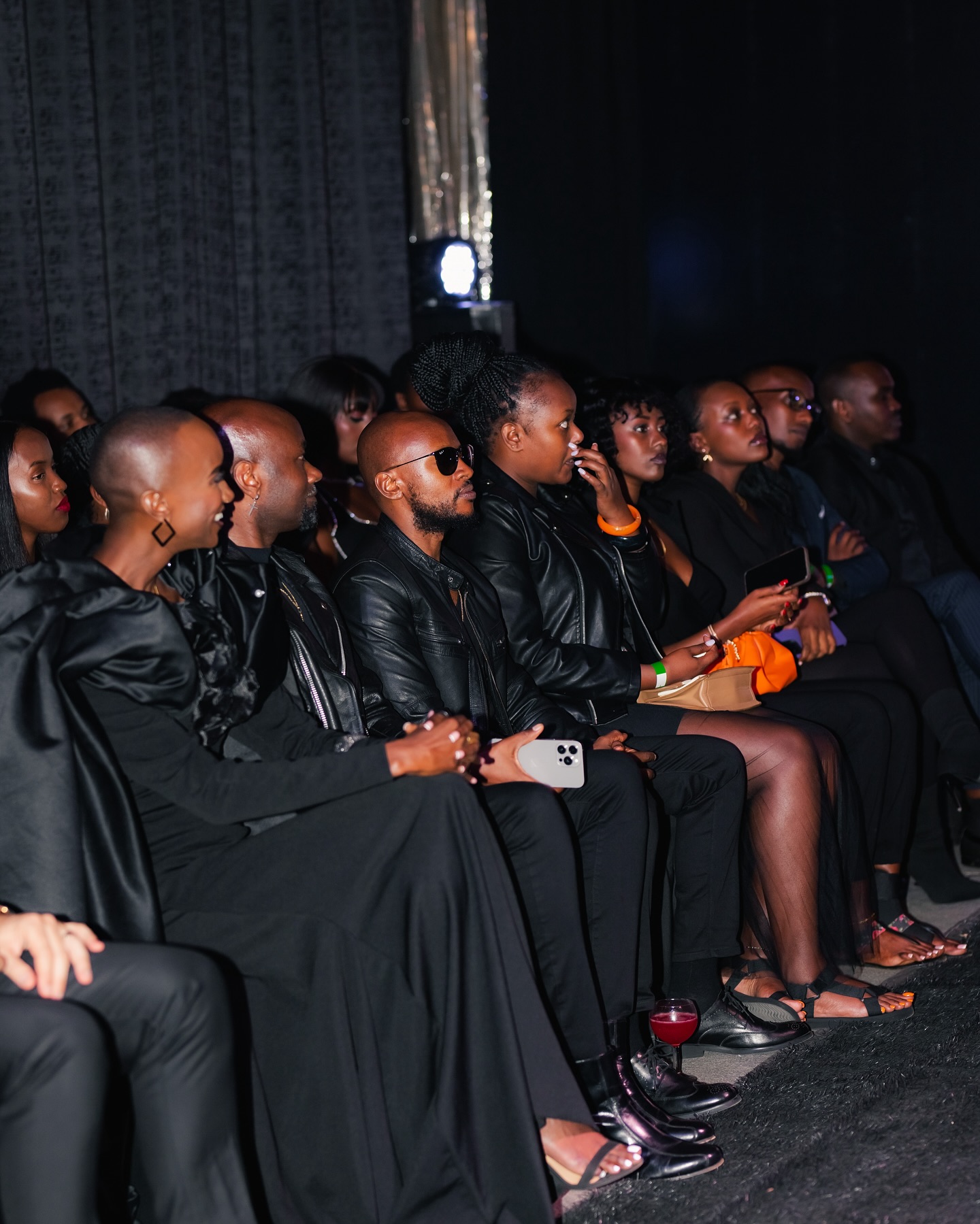 Pre-event of the Stage Fashion Showcase 2024, 2nd Edition, in Kigali [Photo Credit: SFS]
Pre-event of the Stage Fashion Showcase 2024, 2nd Edition, in Kigali [Photo Credit: SFS]
The Stage Fashion Showcase 2024 Pre-Event Highlights Emerging and Established Talents: Main Event Set for November 1
The fashion scene in Kigali is abuzz with excitement as preparations for the Stage Fashion Showcase 2024 2nd edition are in full swing. The recent pre-event, inspired by the All Black Party theme, offered a tantalizing glimpse of what's to come, featuring collections from various local fashion designers and attracting numerous fashion enthusiasts.
 In the photo, Standing in between is Model Sandrine Mucyo CEO and Manager of the Stage Fashion Showcase, Pre-event in Kigali [Photo Credit: SFS]
In the photo, Standing in between is Model Sandrine Mucyo CEO and Manager of the Stage Fashion Showcase, Pre-event in Kigali [Photo Credit: SFS]
Organized by supermodel Sandrine Mucyo through her company Ssanduina LTD, the pre-event took place on October 16, 2024, at Institut Français, Kigali. The location choice proved strategic, as it allowed for free entry, making the event accessible to a wider audience. Mucyo, who manages the showcase, announced that the main event is scheduled for November 1, 2024, at Mundi Center in the heart of Kigali.
 Pre-event of the Stage Fashion Showcase 2024, 2nd Edition, in Kigali [Photo Credit: SFS]
Pre-event of the Stage Fashion Showcase 2024, 2nd Edition, in Kigali [Photo Credit: SFS]
The pre-event was a dazzling affair, with attendees donning elegant black outfits in keeping with the theme. It brought together a diverse group of local fashion designers who showcased their collections before an audience of industry luminaries and special guests. Notable attendees included Kabano Franco, Isimbi Model, DJ Lamper, Boukuru, Sekamana Eric, and Matilda Mangeot, the show's cultural and communication officer. The event also saw the participation of international model Eveline Gonzenbach, alongside Trevor and managers from local modeling agencies.
 Pre-event of the Stage Fashion Showcase 2024, 2nd Edition, in Kigali [Photo Credit: SFS]
Pre-event of the Stage Fashion Showcase 2024, 2nd Edition, in Kigali [Photo Credit: SFS]
Several designers presented their work, each bringing a unique perspective to the runway. Promesse House of Collection, Lisa Crochet with her Glory Winter collection, and Era Crown with a 90s-to-50s-inspired collection were among the highlights. SA Fashion Collection and Maurice Matheo also showcased their latest designs, adding to the diverse array of styles on display.
 Pre-event of the Stage Fashion Showcase 2024, 2nd Edition, in Kigali [Photo Credit: SFS]
Pre-event of the Stage Fashion Showcase 2024, 2nd Edition, in Kigali [Photo Credit: SFS]
The success of the pre-event has set high expectations for the main show. With its focus on celebrating culture, heritage, creativity, and talent within the Rwandan fashion industry, the Stage Fashion Showcase 2024 promises to be a landmark event. The organizers have clearly invested significantly in branding and preparation, as evident from the polished execution of the pre-event.
 Pre-event of the Stage Fashion Showcase 2024, 2nd Edition, in Kigali [Photo Credit: SFS]
Pre-event of the Stage Fashion Showcase 2024, 2nd Edition, in Kigali [Photo Credit: SFS]
However, amidst the excitement, some challenges facing the Rwandan fashion industry were brought to light. During the event, guests of honor highlighted issues such as the scarcity of fashion shows for models to showcase their talents. One guest emphasized the need for investors to support models and the fashion industry at large, underscoring the importance of financial backing for sustained growth.
The Stage Fashion Showcase stands out as currently the only major fashion show event running in Rwanda, raising questions about its capacity to satisfy the numerous models seeking runway opportunities. This scarcity of platforms highlights the potential for growth in the Rwandan fashion scene and the need for more such events to nurture local talent.
 Pre-event of the Stage Fashion Showcase 2024, 2nd Editio, in Kigali [Photo Credit: SFS]
Pre-event of the Stage Fashion Showcase 2024, 2nd Editio, in Kigali [Photo Credit: SFS]
Looking ahead to the main event on November 1, fashion enthusiasts and lovers in Kigali are eagerly anticipating what promises to be a mind-blowing showcase. The organizers are pulling out all the stops, with plans to involve big names and influencers in this year's event. The choice of Mundi Center as the venue places the showcase at the epicenter of Kigali's vibrant culture.
 Pre-event of the Stage Fashion Showcase 2024, 2nd Edition, in Kigali [Photo Credit: SFS]
Pre-event of the Stage Fashion Showcase 2024, 2nd Edition, in Kigali [Photo Credit: SFS]
Model Sandrine Mucyo, founder and manager of the Stage Fashion Showcase, has already confirmed a select team to brand, support, and promote the 2nd edition. This team includes familiar faces from the pre-event such as DJ Lamper, Kabano Franco, Joxk Parker, and Isimbi Model, ensuring continuity and building on the momentum generated by the pre-event.
 Tickets on sale for the Stage Fashion Showcase 2024
Tickets on sale for the Stage Fashion Showcase 2024
As the Stage Fashion Showcase 2024 approaches, it carries the weight of expectations not just as a fashion event, but as a pivotal platform for the Rwandan fashion industry. It represents an opportunity to showcase local talent, attract investment, and put Kigali on the global fashion map. The success of this event could pave the way for more frequent and diverse fashion showcases in Rwanda, addressing the current shortage of opportunities for models and designers alike.
 Pre-event of the Stage Fashion Showcase 2024, 2nd Edition, in Kigali [Photo Credit: SFS]
Pre-event of the Stage Fashion Showcase 2024, 2nd Edition, in Kigali [Photo Credit: SFS]
 Pre-event of the Stage Fashion Showcase 2024, 2nd Edition, in Kigali [Photo Credit: SFS]
Pre-event of the Stage Fashion Showcase 2024, 2nd Edition, in Kigali [Photo Credit: SFS]
 Pre-event of the Stage Fashion Showcase 2024, 2nd Edition, in Kigali [Photo Credit: SFS]
Pre-event of the Stage Fashion Showcase 2024, 2nd Edition, in Kigali [Photo Credit: SFS]
 Pre-event of the Stage Fashion Showcase 2024, 2nd Edition, in Kigali [Photo Credit: SFS]
Pre-event of the Stage Fashion Showcase 2024, 2nd Edition, in Kigali [Photo Credit: SFS]
 Pre-event of the Stage Fashion Showcase 2024, 2nd Edition, in Kigali [Photo Credit: SFS]
Pre-event of the Stage Fashion Showcase 2024, 2nd Edition, in Kigali [Photo Credit: SFS]
 Pre-event of the Stage Fashion Showcase 2024 , 2nd Edition, in Kigali [Photo Credit: SFS]
Pre-event of the Stage Fashion Showcase 2024 , 2nd Edition, in Kigali [Photo Credit: SFS]
 Pre-event of the Stage Fashion Showcase 2024, 2nd Edition, in Kigali [Photo Credit: SFS]
Pre-event of the Stage Fashion Showcase 2024, 2nd Edition, in Kigali [Photo Credit: SFS]
 Pre-event of the Stage Fashion Showcase 2024, 2nd Edition, in Kigali [Photo Credit: SFS]
Pre-event of the Stage Fashion Showcase 2024, 2nd Edition, in Kigali [Photo Credit: SFS]
 Pre-event of the Stage Fashion Showcase 2024, 2nd Edition, in Kigali [Photo Credit: SFS]
Pre-event of the Stage Fashion Showcase 2024, 2nd Edition, in Kigali [Photo Credit: SFS]
Adopting Sustainable Fashion Practices and Understanding the Market's Needs
Fashion Trends Africa by RCFS recently organized a virtual conference bringing together fashion designers and experts from East Africa and beyond. Participants from Uganda, Kenya, Ghana, Ethiopia, Spain, and Rwanda convened to discuss the current state and future prospects of the East African fashion industry. The conference focused on sustainability, market understanding, and the challenges faced by African designers in the global arena.
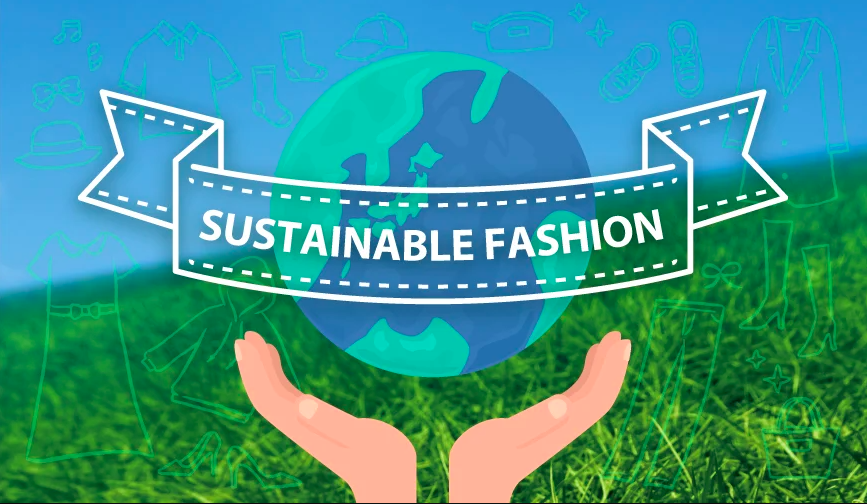 Will fashion save our planet if our community understands sustainable fashion? [Photo Credit: NET]
Will fashion save our planet if our community understands sustainable fashion? [Photo Credit: NET]
The session began with introductions from key participants, including Celestin, CEO and founder of the Rwanda Cultural Fashion Show, and Wyne, a Ugandan fashion designer based in Barcelona, Spain. Celestin outlined the agenda for the 2-hour session, setting the stage for discussions on East African fashion and sustainability.
Wyne shared her journey in the fashion industry, highlighting her work with celebrities and her recent rebranding efforts. Maximilien, a stylist-turned-fashion designer from Rwanda, discussed his transition and his involvement in developing the national curriculum for fashion design at the Rwanda Polytechnic. He emphasized the need for a support hub for fashion designers in Rwanda, proposing an ecosystem called Kuza Africa to provide designers with access to information, education, and infrastructure.
 The Collection Made by WYNE KIRABO, a Ugandan fashion designer based in Barcelona [Photo Credit: WYNE]
The Collection Made by WYNE KIRABO, a Ugandan fashion designer based in Barcelona [Photo Credit: WYNE]
Sustainability emerged as a central theme of the conference. Maximilien stressed the unique opportunity for African designers to adopt sustainable practices as they build their systems from the ground up. Wyne echoed this sentiment, noting that her African heritage has given her a competitive advantage in the European market. She emphasized the importance of understanding market needs and maintaining high-quality standards in designs.
The challenges faced by African designers were openly discussed. These included limited access to quality fabrics and fierce competition from fast fashion brands. However, participants viewed these challenges as opportunities for growth and innovation. Wyne encouraged designers to look beyond local markets and capitalize on global opportunities, such as sustainability initiatives and international fashion weeks.
Maximilien highlighted the growing trend of alternative, eco-friendly fabrics in the fashion industry. He noted that Africa's abundance of these materials could provide a significant competitive advantage. The conversation also touched on the importance of adopting circular economy principles, such as repair, reuse, and recycling, to promote sustainability and reduce waste.
 The Collection Made by KOLBE [Photo Credit: KOLBE]
The Collection Made by KOLBE [Photo Credit: KOLBE]
The issue of competing with cheaper Chinese products was addressed. Wyne and Maximilien discussed the factors contributing to lower prices of Chinese goods, including mass production, lower labor costs, and the use of synthetic fabrics. They emphasized the need for local textile production and industrialization in Africa to reduce costs and increase competitiveness.
 The Collection Made by WYNE KIRABO, a Ugandan fashion designer based in Barcelona [Photo Credit: WYNE]
The Collection Made by WYNE KIRABO, a Ugandan fashion designer based in Barcelona [Photo Credit: WYNE]
Wyne shared her business model, which focuses on custom-made, timeless pieces and slow fashion production. She also discussed her clothing rental service, which caters to clients attending special events. Both Wyne and Maximilien stressed their commitment to sustainability, including eco-friendly packaging, sourcing fabrics locally, and supporting education initiatives.
The conference also addressed the role of models in showcasing fashion and the need for fashion designers to understand and implement sustainability practices. Participants acknowledged the challenge of balancing sustainability with economic viability but emphasized its importance for the future of the industry.
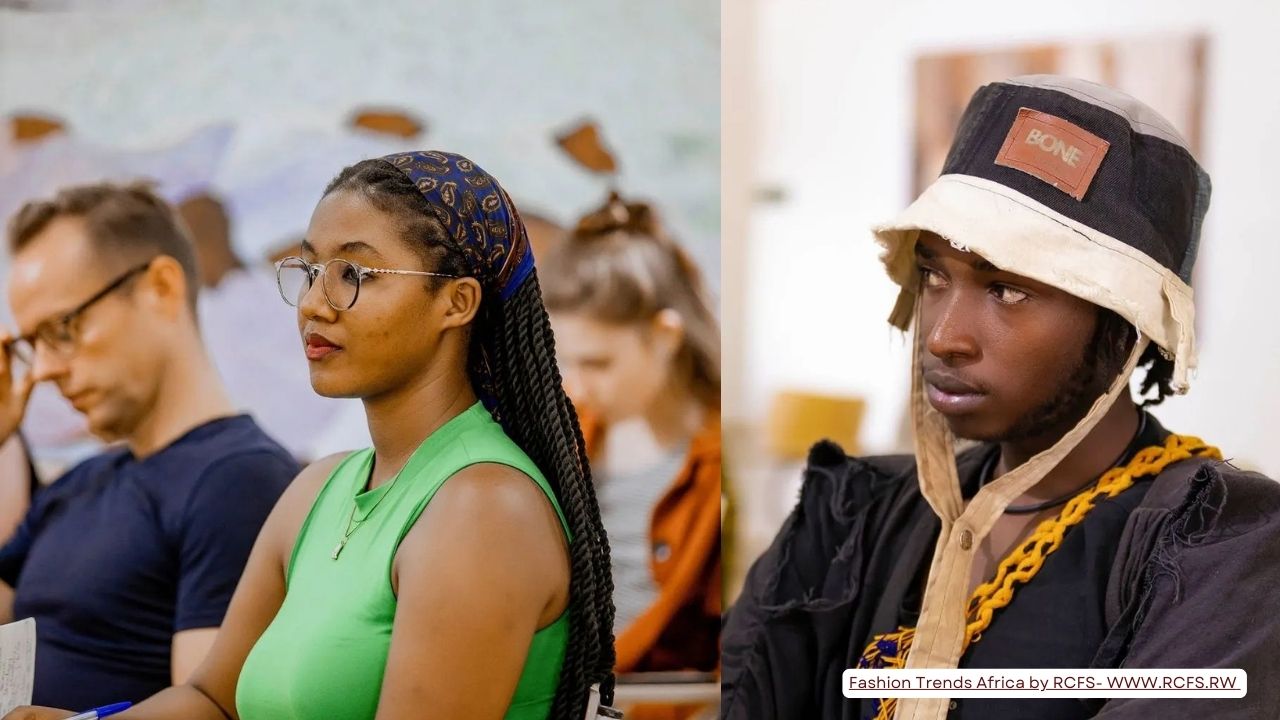 The Collection Made by KOLBE [Photo Credit: KOLBE]
The Collection Made by KOLBE [Photo Credit: KOLBE]
Advice for emerging designers was a key topic. Wyne stressed the importance of understanding competition and market trends, rather than focusing solely on financial gain. She emphasized the need for a strong brand identity, persistence, and leveraging social media for networking and promotion. Maximilien added that designers should invest in research and data to enhance the quality and craftsmanship of East African fashion.
 The Collection Made by WYNE KIRABO, a Ugandan fashion designer based in Barcelona [Photo Credit: WYNE]
The Collection Made by WYNE KIRABO, a Ugandan fashion designer based in Barcelona [Photo Credit: WYNE]
The development of mass brands to cater to the growing population was suggested as a strategy for creating sustainable and competitive businesses in the region. Participants discussed the use of organic or recyclable fabrics and the importance of traceability in production. They also highlighted the need for educating both manufacturers and consumers on sustainable practices.
Strategies for changing international perceptions of African fashion were explored. Maximilien emphasized the importance of quality, adherence to international standards, and effective branding. He suggested that brands should understand their target market, communicate effectively, and use professional content. The importance of social media and understanding local market tendencies was also stressed.
 The collection Made by WYNE KIRABO , a Ugandan fashion designer based in Barcelona [Photo Credit: WYNE]
The collection Made by WYNE KIRABO , a Ugandan fashion designer based in Barcelona [Photo Credit: WYNE]
Professionalism in the industry was identified as crucial. This includes understanding business aspects like accounting and logistics and utilizing social media effectively. Participants agreed that there is no inherent difference between African fashion and international fashion and that the vibrancy and uniqueness of African prints could be a distinguishing factor without limiting their global appeal.
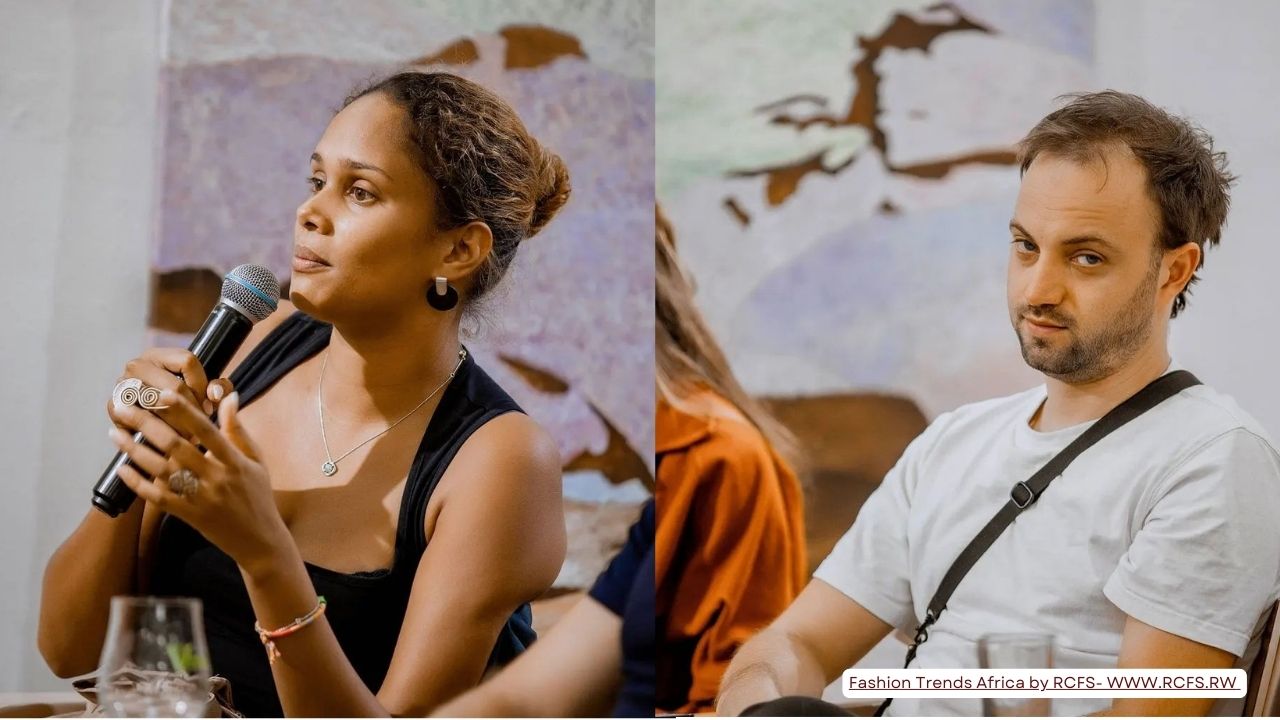 The Collections Made by KOLBE [Photo Credit: KOLBE]
The Collections Made by KOLBE [Photo Credit: KOLBE]
The conference concluded with a discussion on showcasing African fashion to the international market. Participants emphasized the need for Africans to develop their own industry and create awareness for international investment in Africa. Personal branding and presenting work directly to the international market were identified as key strategies for attracting investment and recognition.
Adopting Sustainable Fashion Practices and Understanding the Market's Needs
Fashion Trends Africa by RCFS recently organized a virtual conference bringing together fashion designers and experts from East Africa and beyond. Participants from Uganda, Kenya, Ghana, Ethiopia, Spain, and Rwanda convened to discuss the current state and future prospects of the East African fashion industry. The conference focused on sustainability, market understanding, and the challenges faced by African designers in the global arena.
 Will fashion save our planet if our community understands sustainable fashion? [Photo Credit: NET]
Will fashion save our planet if our community understands sustainable fashion? [Photo Credit: NET]
The session began with introductions from key participants, including Celestin, CEO and founder of the Rwanda Cultural Fashion Show, and Wyne, a Ugandan fashion designer based in Barcelona, Spain. Celestin outlined the agenda for the 2-hour session, setting the stage for discussions on East African fashion and sustainability.
Wyne shared her journey in the fashion industry, highlighting her work with celebrities and her recent rebranding efforts. Maximilien, a stylist-turned-fashion designer from Rwanda, discussed his transition and his involvement in developing the national curriculum for fashion design at the Rwanda Polytechnic. He emphasized the need for a support hub for fashion designers in Rwanda, proposing an ecosystem called Kuza Africa to provide designers with access to information, education, and infrastructure.
 The Collection Made by WYNE KIRABO, a Ugandan fashion designer based in Barcelona [Photo Credit: WYNE]
The Collection Made by WYNE KIRABO, a Ugandan fashion designer based in Barcelona [Photo Credit: WYNE]
Sustainability emerged as a central theme of the conference. Maximilien stressed the unique opportunity for African designers to adopt sustainable practices as they build their systems from the ground up. Wyne echoed this sentiment, noting that her African heritage has given her a competitive advantage in the European market. She emphasized the importance of understanding market needs and maintaining high-quality standards in designs.
The challenges faced by African designers were openly discussed. These included limited access to quality fabrics and fierce competition from fast fashion brands. However, participants viewed these challenges as opportunities for growth and innovation. Wyne encouraged designers to look beyond local markets and capitalize on global opportunities, such as sustainability initiatives and international fashion weeks.
Maximilien highlighted the growing trend of alternative, eco-friendly fabrics in the fashion industry. He noted that Africa's abundance of these materials could provide a significant competitive advantage. The conversation also touched on the importance of adopting circular economy principles, such as repair, reuse, and recycling, to promote sustainability and reduce waste.
 The Collection Made by KOLBE [Photo Credit: KOLBE]
The Collection Made by KOLBE [Photo Credit: KOLBE]
The issue of competing with cheaper Chinese products was addressed. Wyne and Maximilien discussed the factors contributing to lower prices of Chinese goods, including mass production, lower labor costs, and the use of synthetic fabrics. They emphasized the need for local textile production and industrialization in Africa to reduce costs and increase competitiveness.
 The Collection Made by WYNE KIRABO, a Ugandan fashion designer based in Barcelona [Photo Credit: WYNE]
The Collection Made by WYNE KIRABO, a Ugandan fashion designer based in Barcelona [Photo Credit: WYNE]
Wyne shared her business model, which focuses on custom-made, timeless pieces and slow fashion production. She also discussed her clothing rental service, which caters to clients attending special events. Both Wyne and Maximilien stressed their commitment to sustainability, including eco-friendly packaging, sourcing fabrics locally, and supporting education initiatives.
The conference also addressed the role of models in showcasing fashion and the need for fashion designers to understand and implement sustainability practices. Participants acknowledged the challenge of balancing sustainability with economic viability but emphasized its importance for the future of the industry.
 The Collection Made by KOLBE [Photo Credit: KOLBE]
The Collection Made by KOLBE [Photo Credit: KOLBE]
Advice for emerging designers was a key topic. Wyne stressed the importance of understanding competition and market trends, rather than focusing solely on financial gain. She emphasized the need for a strong brand identity, persistence, and leveraging social media for networking and promotion. Maximilien added that designers should invest in research and data to enhance the quality and craftsmanship of East African fashion.
 The Collection Made by WYNE KIRABO, a Ugandan fashion designer based in Barcelona [Photo Credit: WYNE]
The Collection Made by WYNE KIRABO, a Ugandan fashion designer based in Barcelona [Photo Credit: WYNE]
The development of mass brands to cater to the growing population was suggested as a strategy for creating sustainable and competitive businesses in the region. Participants discussed the use of organic or recyclable fabrics and the importance of traceability in production. They also highlighted the need for educating both manufacturers and consumers on sustainable practices.
Strategies for changing international perceptions of African fashion were explored. Maximilien emphasized the importance of quality, adherence to international standards, and effective branding. He suggested that brands should understand their target market, communicate effectively, and use professional content. The importance of social media and understanding local market tendencies was also stressed.
 The Collection Made by WYNE KIRABO, a Ugandan fashion designer based in Barcelona [Photo Credit: WYNE]
The Collection Made by WYNE KIRABO, a Ugandan fashion designer based in Barcelona [Photo Credit: WYNE]
Professionalism in the industry was identified as crucial. This includes understanding business aspects like accounting and logistics and utilizing social media effectively. Participants agreed that there is no inherent difference between African fashion and international fashion and that the vibrancy and uniqueness of African prints could be a distinguishing factor without limiting their global appeal.
 The Collection Made by KOLBE [Photo Credit: KOLBE]
The Collection Made by KOLBE [Photo Credit: KOLBE]
The conference concluded with a discussion on showcasing African fashion to the international market. Participants emphasized the need for Africans to develop their own industry and create awareness for international investment in Africa. Personal branding and presenting work directly to the international market were identified as key strategies for attracting investment and recognition.
Sustainable fashion has gained traction in many East African countries, with local designers increasingly aware of its importance. However, according to a fashion expert interviewed by RCFS's MEDIA, there's still a significant gap in understanding and implementing truly sustainable practices in the region's fashion industry.
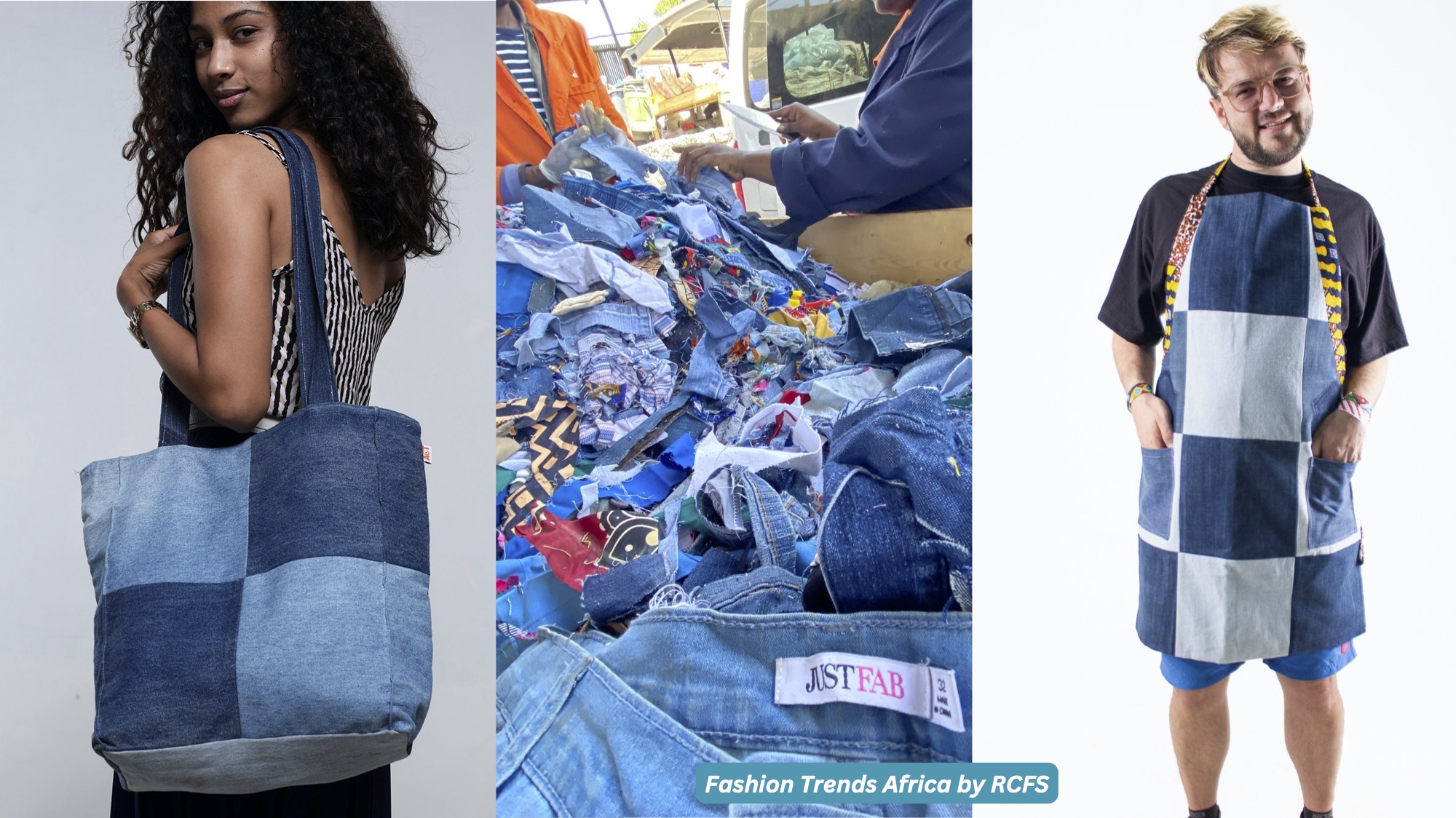 Made from recycled fabrics by Maisha by Nisria a Kenyan fashion brand [Photo Credit: Maisha]
Made from recycled fabrics by Maisha by Nisria a Kenyan fashion brand [Photo Credit: Maisha]
The expert, provided insights into the current state of sustainable fashion in East Africa, highlighting both progress and challenges.
"East Africa comprises eight countries, each striving to boost and develop its fashion industry. Many upcoming designers in these countries are incredibly creative," the expert notes. "You'll see them repurposing various waste materials, creating fashionable items like shoes from tires, or upcycling second-hand clothes into new collections."
However, the expert cautions that these practices, while innovative, don't necessarily equate to comprehensive sustainable fashion. "Some of these examples lead our community to view these designers as sustainable, but there's still a long way to go. First, the community needs to understand what sustainable fashion truly entails to be part of that sustainability."
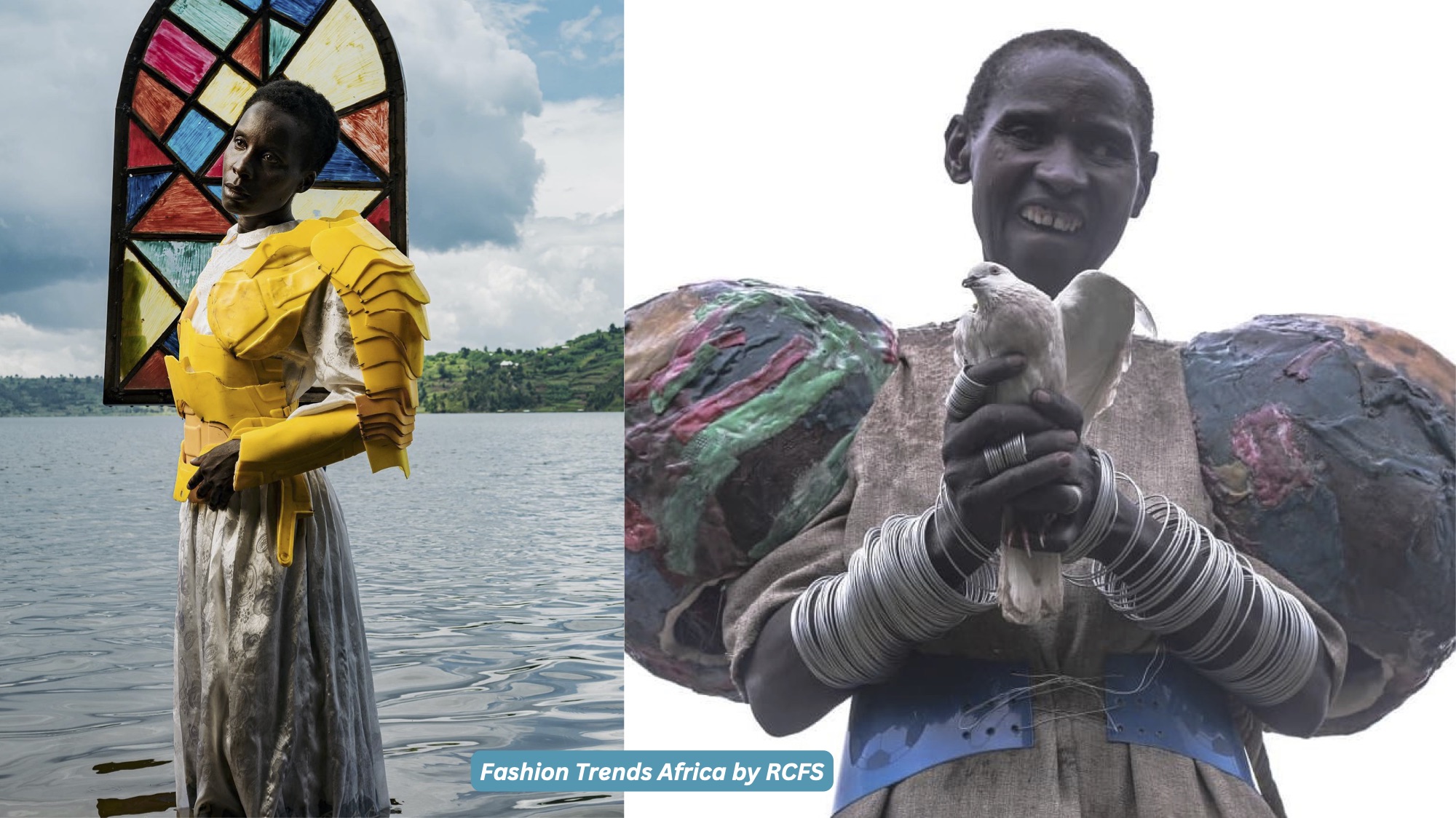 Made from recycled fabrics and materials by Cedrick Mizero a Rwandan fashion brand [Photo Credit: IG]
Made from recycled fabrics and materials by Cedrick Mizero a Rwandan fashion brand [Photo Credit: IG]
The expert emphasizes the need for a more holistic approach: "Sustainable and ethical fashion aims to minimize the industry's negative environmental impact while maximizing benefits to promote the ethical treatment of workers."
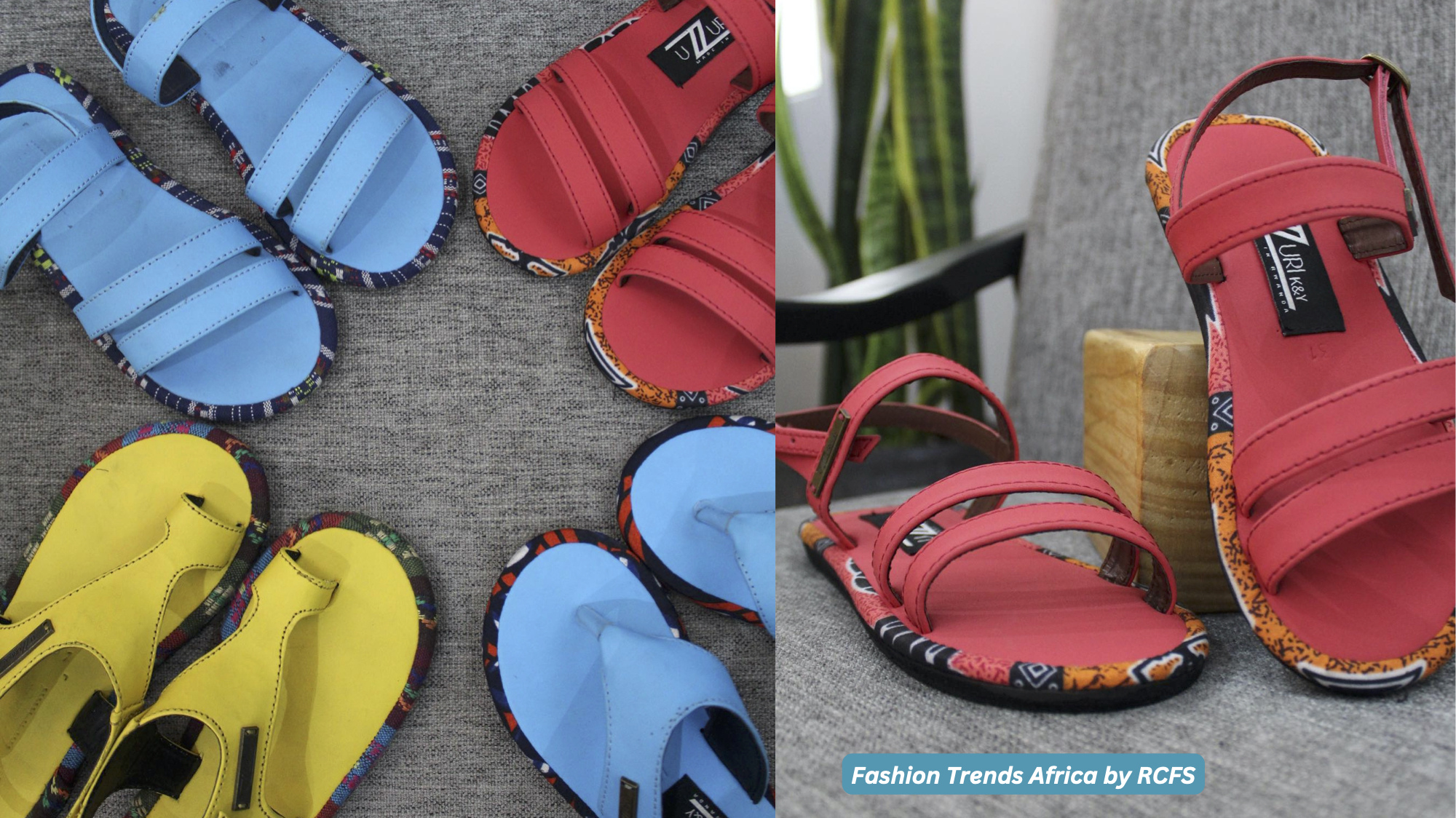
Made from recycled tires by Uzuri K & Y, a Rwandan fashion brand [Photo Credit: UZURI]
Several East African countries are focusing on developing their local textile and garment industries, emphasizing fair labor practices and supporting local communities. Kenya, for instance, has over 50 fashion projects that integrate sustainable practices, including those of both designers and medium-sized textile manufacturers.
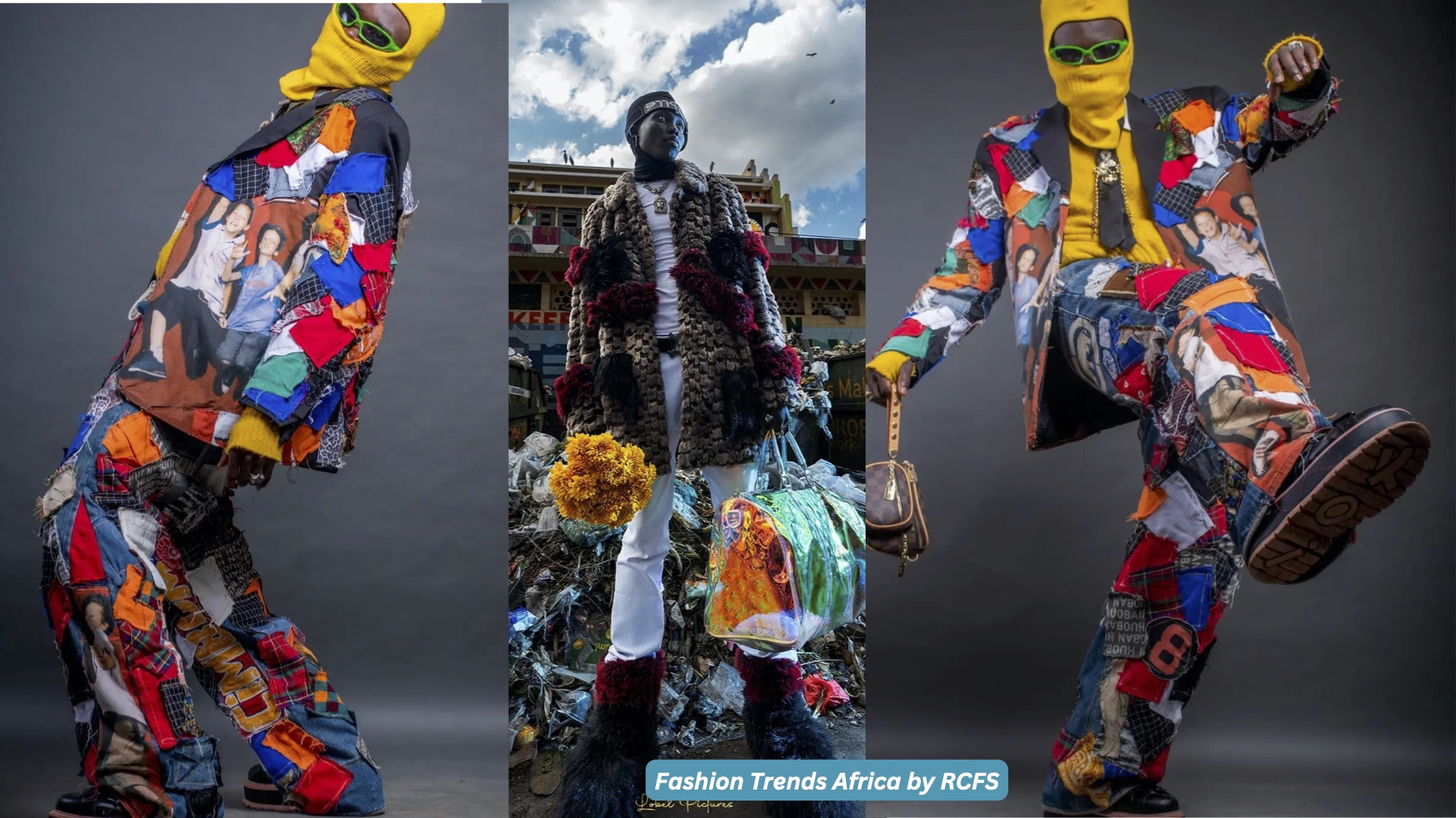 Made from recycled fabrics by Kenyan-Raw a Kenyan fashion brand [Photo Credit: IG]
Made from recycled fabrics by Kenyan-Raw a Kenyan fashion brand [Photo Credit: IG]
"Among these 50 local fashion entrepreneurs, some buy second-hand clothes and make them wearable again. Should we call them sustainable fashion designers? I don't have a definitive answer to this question," the expert ponders, highlighting the complexity of defining sustainability in fashion.
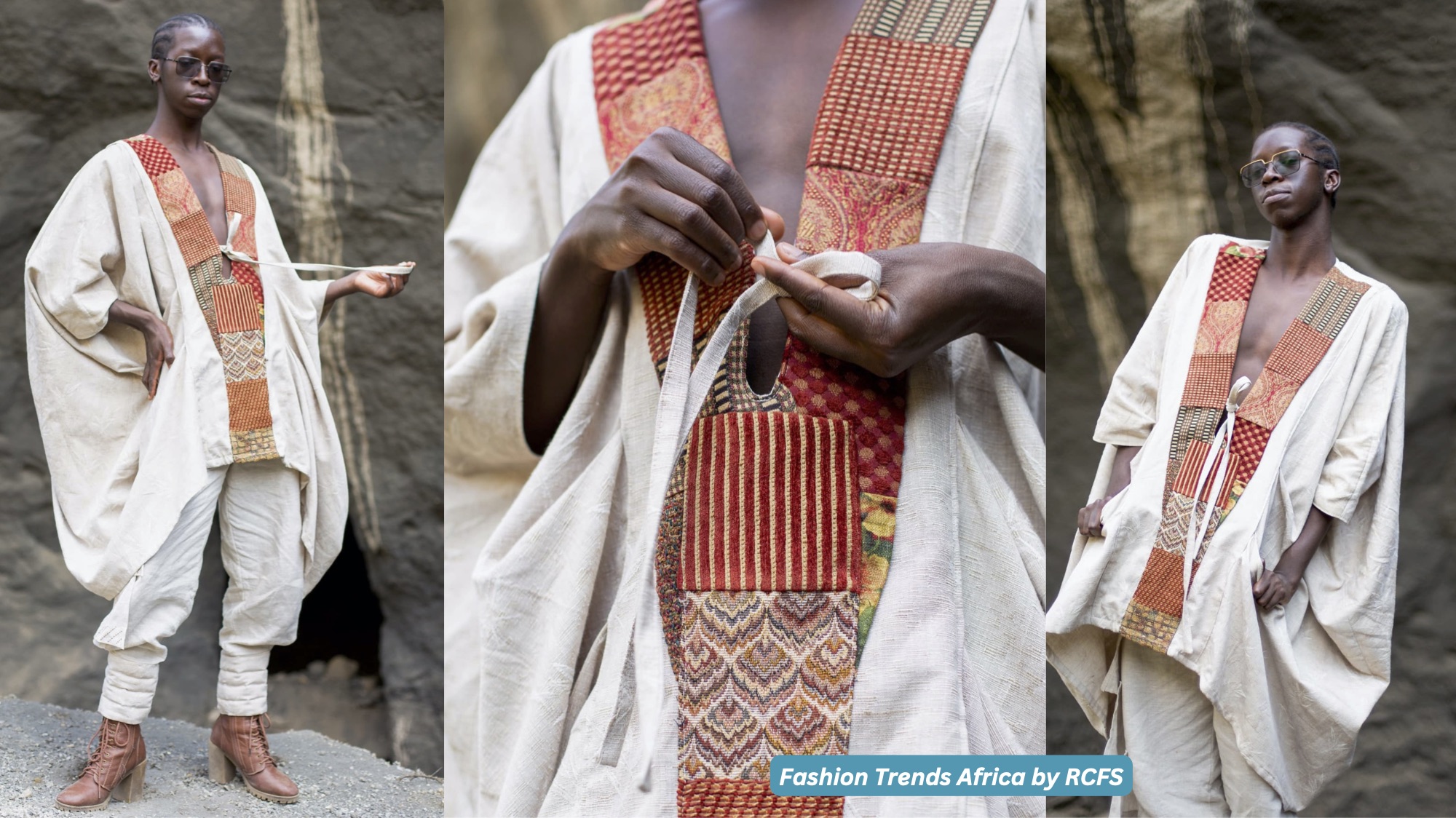
Made from recycled fabrics by Maisha by Nisria a Kenyan fashion brand [Photo Credit: Maisha]
One of the main hurdles in promoting sustainable fashion in East Africa is the lack of environmental education. "To get to the root of sustainability, it's important to understand how people in East Africa are educated on the matter. Most public schools don't teach about environmental issues, so there's little awareness in the community," the expert explains.
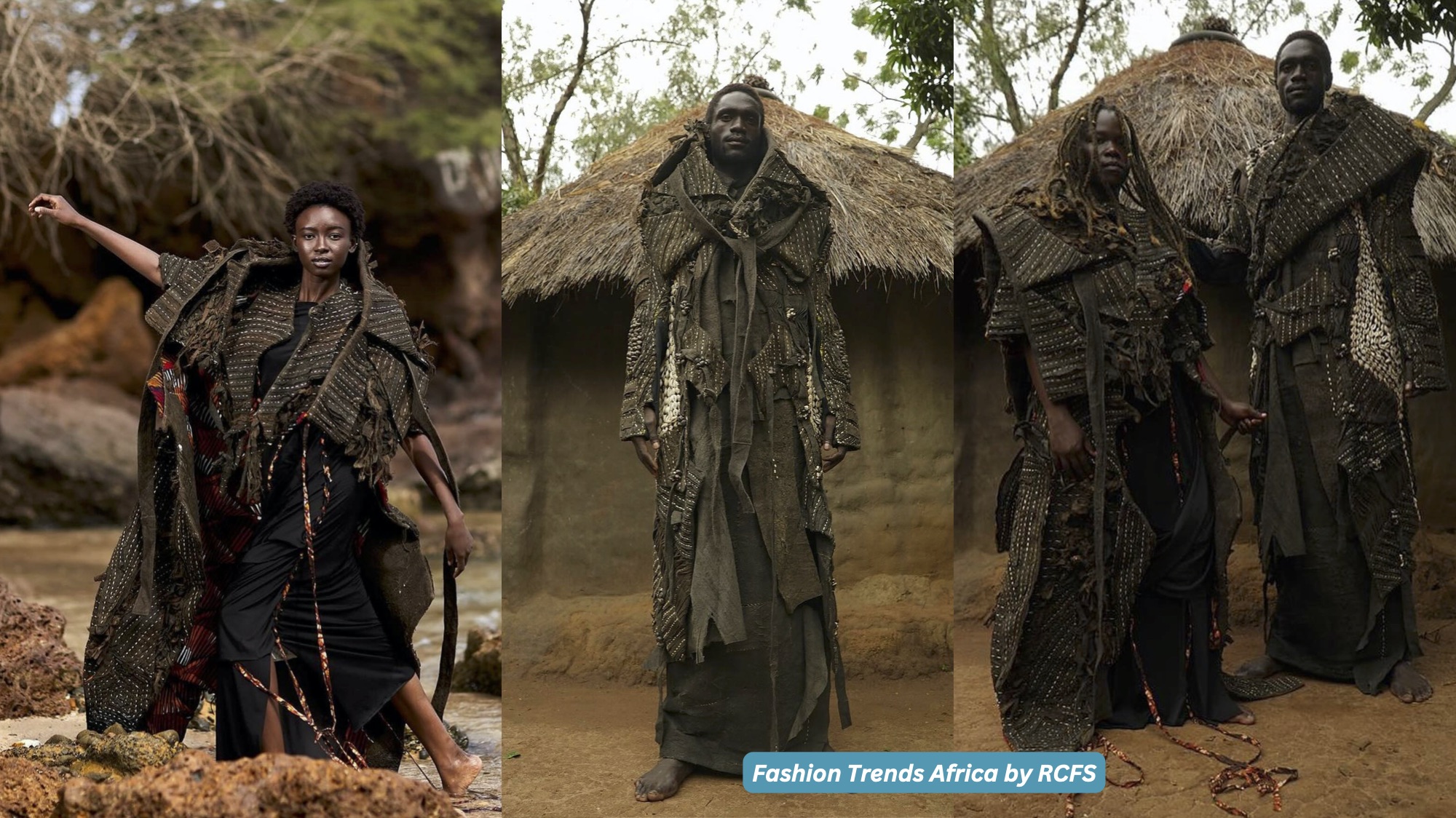 Made from recycled fabrics by a Ugandan fashion brand [Photo Credit: IGC]
Made from recycled fabrics by a Ugandan fashion brand [Photo Credit: IGC]
This lack of awareness extends to consumer behavior. "Africans are rarely penalized for littering or engaging in environmentally harmful practices. Many East Africans express that they don't deeply think about their consumer habits until they become well-traveled and highly educated."
The result is a challenging market for sustainable fashion. "Generally, fashion designers who try to push ethical fashion practices have a hard time doing so in societies that prefer fast fashion over high-quality and sustainable products," the expert notes.
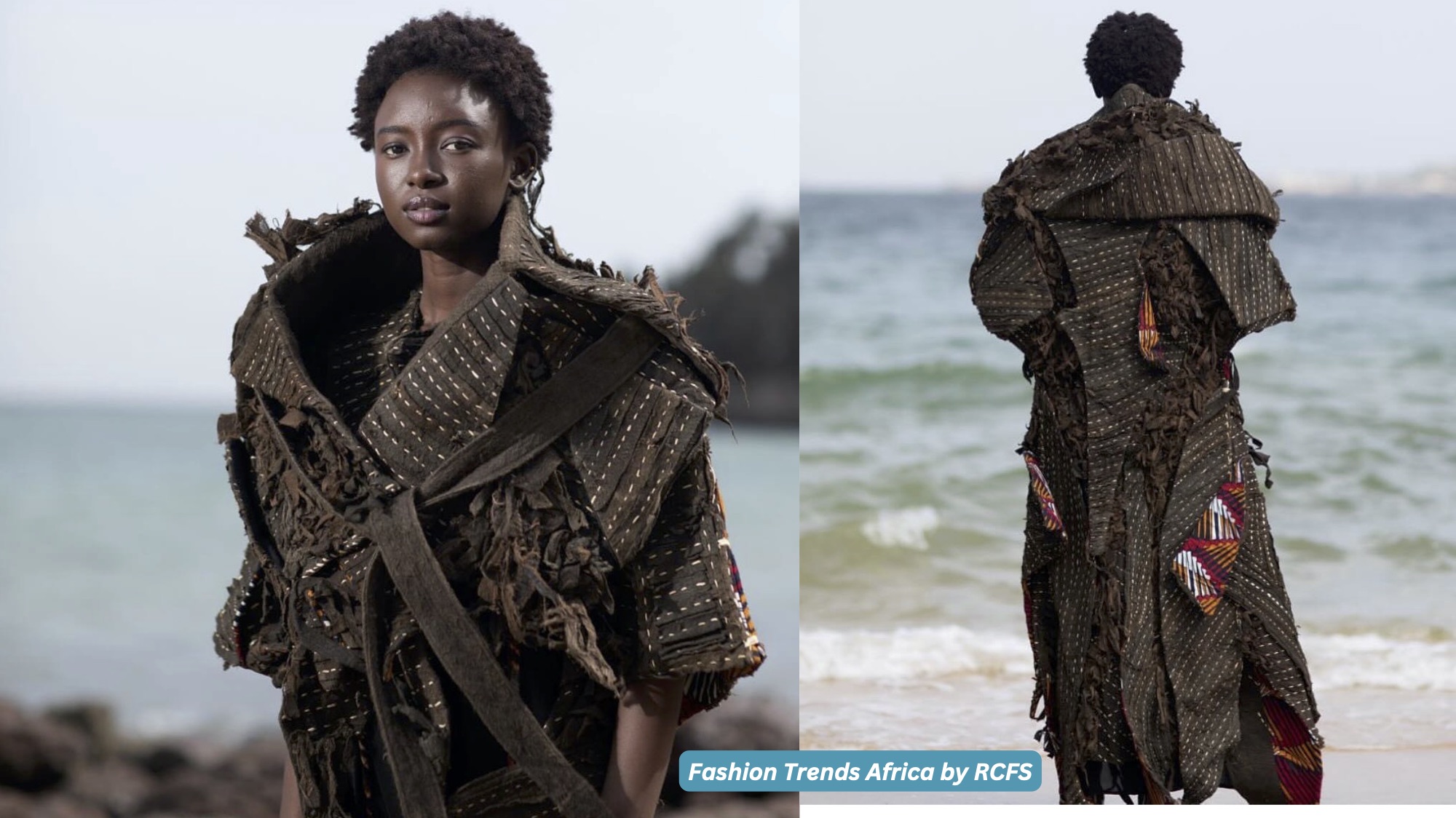 Made from recycled fabrics by a Ugandan fashion brand [Photo Credit: IGC]
Made from recycled fabrics by a Ugandan fashion brand [Photo Credit: IGC]
Well-established East African fashion designers interviewed by RCFS's MEDIA expressed challenges in maintaining ethical and sustainable brands, with pricing being a significant issue. Ethical fashion often involves higher costs due to fair worker compensation and the use of high-quality, durable materials.
"When fashion is sold at a reasonable price, workers can receive fair compensation for their work," one designer explains. "Ethical fashion uses long-lasting, reliable materials and is designed with skill and expertise to give consumers their money's worth. It's not cheap because good quality materials can be slightly expensive."
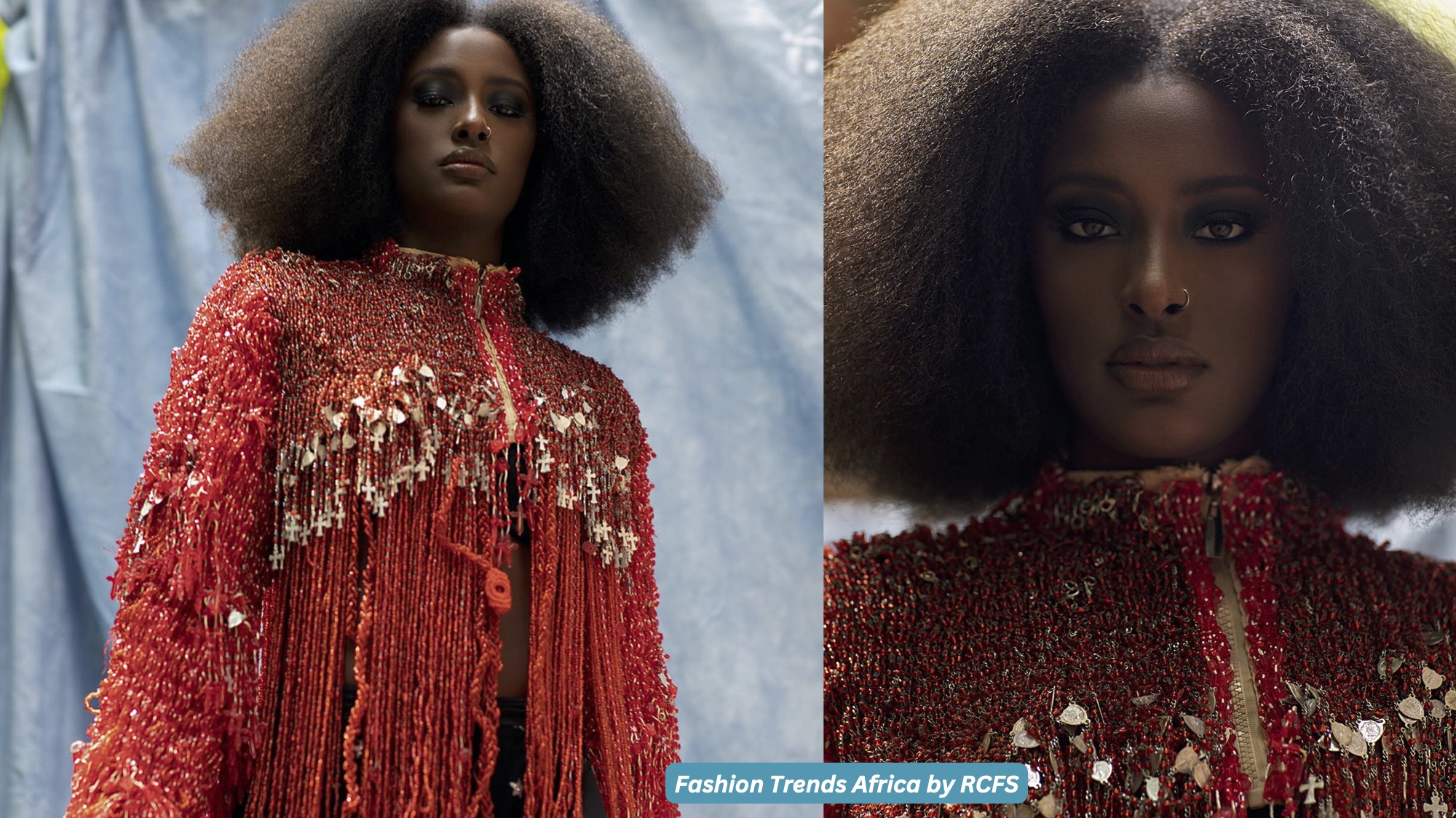 Made from recycled fabrics and materials by Cedrick Mizero a Rwandan fashion brand [Photo Credit: IG]
Made from recycled fabrics and materials by Cedrick Mizero a Rwandan fashion brand [Photo Credit: IG]
This pricing structure creates a dilemma: participating in an ethical fashion as a consumer could be a privilege that not many people can afford. Due to higher prices, consumers are less likely to engage with ethical fashion brands, creating a barrier to the widespread adoption of sustainable practices.
According to the Expert, the East African fashion designers show creativity and innovation in their approach to sustainability. However, it’s clear the industry needs more comprehensive education and support systems to fully embrace sustainable fashion practices.
 The East African fashion designers' creativity in sustainable fashion continues to increase [Photo Credit: IG]
The East African fashion designers' creativity in sustainable fashion continues to increase [Photo Credit: IG]
To address these challenges and promote a better understanding of sustainable fashion in East Africa, industry stakeholders are taking action. Fashion Trends by the RCFS is organizing a virtual conference titled "The State of East African Fashion and Sustainable Practices." This event aims to bring together fashion entrepreneurs, enthusiasts, and industry professionals for an insightful discussion on regional trends and sustainable practices.
Attendees will have the opportunity to engage in live discussions, share their views, and ask questions directly to guest speakers and moderators.
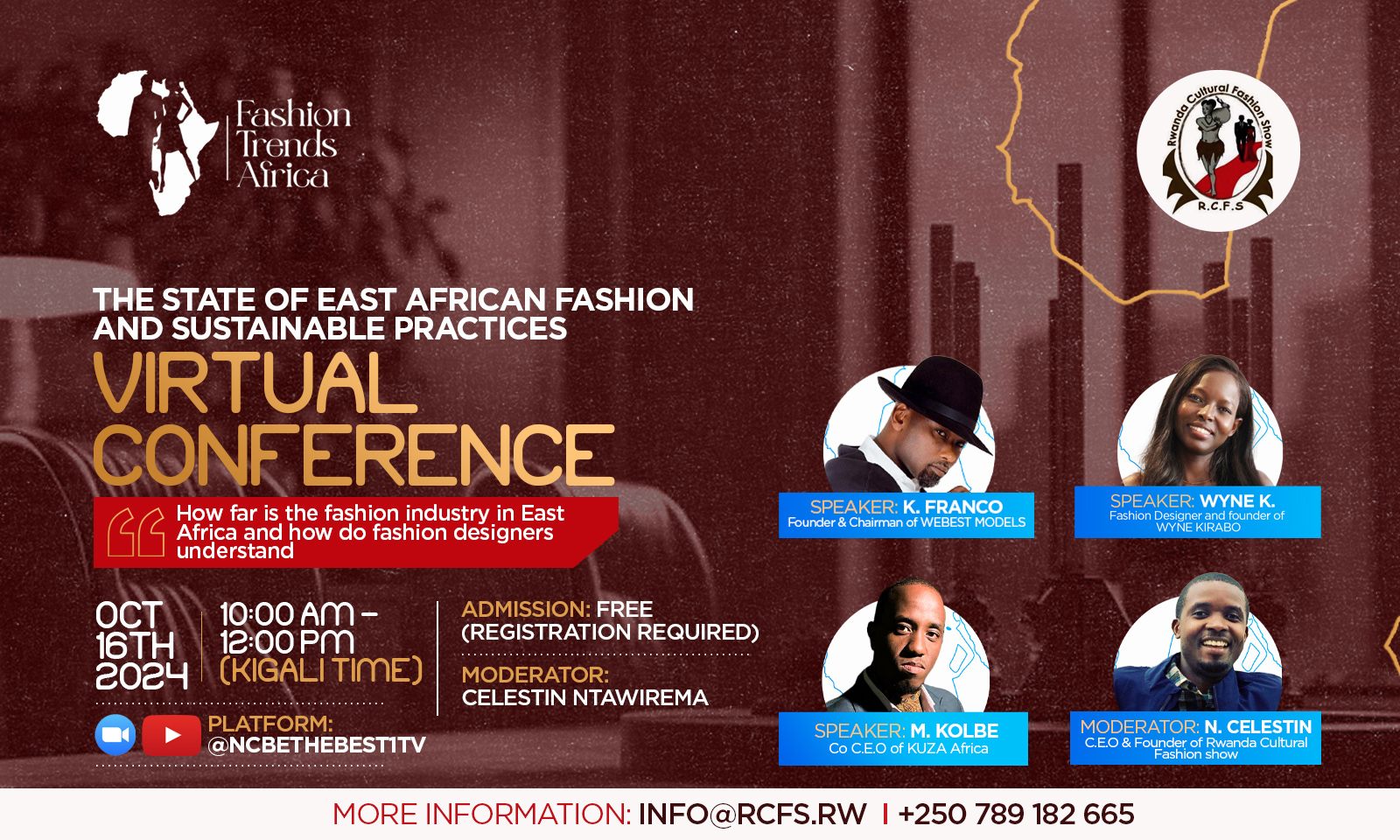
Sustainable fashion has gained traction in many East African countries, with local designers increasingly aware of its importance. However, according to a fashion expert interviewed by RCFS's MEDIA, there's still a significant gap in understanding and implementing truly sustainable practices in the region's fashion industry.
 Made from recycled fabrics by Maisha by Nisria a Kenyan fashion brand [Photo Credit: Maisha]
Made from recycled fabrics by Maisha by Nisria a Kenyan fashion brand [Photo Credit: Maisha]
The expert, provided insights into the current state of sustainable fashion in East Africa, highlighting both progress and challenges.
"East Africa comprises eight countries, each striving to boost and develop its fashion industry. Many upcoming designers in these countries are incredibly creative," the expert notes. "You'll see them repurposing various waste materials, creating fashionable items like shoes from tires, or upcycling second-hand clothes into new collections."
However, the expert cautions that these practices, while innovative, don't necessarily equate to comprehensive sustainable fashion. "Some of these examples lead our community to view these designers as sustainable, but there's still a long way to go. First, the community needs to understand what sustainable fashion truly entails to be part of that sustainability."
 Made from recycled fabrics and materials by Cedrick Mizero a Rwandan fashion brand [Photo Credit: IG]
Made from recycled fabrics and materials by Cedrick Mizero a Rwandan fashion brand [Photo Credit: IG]
The expert emphasizes the need for a more holistic approach: "Sustainable and ethical fashion aims to minimize the industry's negative environmental impact while maximizing benefits to promote the ethical treatment of workers."

Made from recycled tires by Uzuri K & Y, a Rwandan fashion brand [Photo Credit: UZURI]
Several East African countries are focusing on developing their local textile and garment industries, emphasizing fair labor practices and supporting local communities. Kenya, for instance, has over 50 fashion projects that integrate sustainable practices, including those of both designers and medium-sized textile manufacturers.
 Made from recycled fabrics by Kenyan-Raw a Kenyan fashion brand [Photo Credit: IG]
Made from recycled fabrics by Kenyan-Raw a Kenyan fashion brand [Photo Credit: IG]
"Among these 50 local fashion entrepreneurs, some buy second-hand clothes and make them wearable again. Should we call them sustainable fashion designers? I don't have a definitive answer to this question," the expert ponders, highlighting the complexity of defining sustainability in fashion.

Made from recycled fabrics by Maisha by Nisria a Kenyan fashion brand [Photo Credit: Maisha]
One of the main hurdles in promoting sustainable fashion in East Africa is the lack of environmental education. "To get to the root of sustainability, it's important to understand how people in East Africa are educated on the matter. Most public schools don't teach about environmental issues, so there's little awareness in the community," the expert explains.
 Made from recycled fabrics by a Ugandan fashion brand [Photo Credit: IGC]
Made from recycled fabrics by a Ugandan fashion brand [Photo Credit: IGC]
This lack of awareness extends to consumer behavior. "Africans are rarely penalized for littering or engaging in environmentally harmful practices. Many East Africans express that they don't deeply think about their consumer habits until they become well-traveled and highly educated."
The result is a challenging market for sustainable fashion. "Generally, fashion designers who try to push ethical fashion practices have a hard time doing so in societies that prefer fast fashion over high-quality and sustainable products," the expert notes.
 Made from recycled fabrics by a Ugandan fashion brand [Photo Credit: IGC]
Made from recycled fabrics by a Ugandan fashion brand [Photo Credit: IGC]
Well-established East African fashion designers interviewed by RCFS's MEDIA expressed challenges in maintaining ethical and sustainable brands, with pricing being a significant issue. Ethical fashion often involves higher costs due to fair worker compensation and the use of high-quality, durable materials.
"When fashion is sold at a reasonable price, workers can receive fair compensation for their work," one designer explains. "Ethical fashion uses long-lasting, reliable materials and is designed with skill and expertise to give consumers their money's worth. It's not cheap because good quality materials can be slightly expensive."
 Made from recycled fabrics and materials by Cedrick Mizero a Rwandan fashion brand [Photo Credit: IG]
Made from recycled fabrics and materials by Cedrick Mizero a Rwandan fashion brand [Photo Credit: IG]
This pricing structure creates a dilemma: participating in an ethical fashion as a consumer could be a privilege that not many people can afford. Due to higher prices, consumers are less likely to engage with ethical fashion brands, creating a barrier to the widespread adoption of sustainable practices.
According to the Expert, the East African fashion designers show creativity and innovation in their approach to sustainability. However, it’s clear the industry needs more comprehensive education and support systems to fully embrace sustainable fashion practices.
 The East African fashion designers' creativity in sustainable fashion continues to increase [Photo Credit: IG]
The East African fashion designers' creativity in sustainable fashion continues to increase [Photo Credit: IG]
To address these challenges and promote a better understanding of sustainable fashion in East Africa, industry stakeholders are taking action. Fashion Trends by the RCFS is organizing a virtual conference titled "The State of East African Fashion and Sustainable Practices." This event aims to bring together fashion entrepreneurs, enthusiasts, and industry professionals for an insightful discussion on regional trends and sustainable practices.
Attendees will have the opportunity to engage in live discussions, share their views, and ask questions directly to guest speakers and moderators.

Do East African Fashion Designers Understand Sustainable Fashion? A Fashion Expert Weighs In
Sustainable fashion has gained traction in many East African countries, with local designers increasingly aware of its importance. However, according to a fashion expert interviewed by RCFS's MEDIA, there's still a significant gap in understanding and implementing truly sustainable practices in the region's fashion industry.
 Made from recycled fabrics by Maisha by Nisria a Kenyan fashion brand [Photo Credit: Maisha]
Made from recycled fabrics by Maisha by Nisria a Kenyan fashion brand [Photo Credit: Maisha]
The expert, provided insights into the current state of sustainable fashion in East Africa, highlighting both progress and challenges.
"East Africa comprises eight countries, each striving to boost and develop its fashion industry. Many upcoming designers in these countries are incredibly creative," the expert notes. "You'll see them repurposing various waste materials, creating fashionable items like shoes from tires, or upcycling second-hand clothes into new collections."
However, the expert cautions that these practices, while innovative, don't necessarily equate to comprehensive sustainable fashion. "Some of these examples lead our community to view these designers as sustainable, but there's still a long way to go. First, the community needs to understand what sustainable fashion truly entails to be part of that sustainability."
 Made from recycled fabrics and materials by Cedrick Mizero a Rwandan fashion brand [Photo Credit: IG]
Made from recycled fabrics and materials by Cedrick Mizero a Rwandan fashion brand [Photo Credit: IG]
The expert emphasizes the need for a more holistic approach: "Sustainable and ethical fashion aims to minimize the industry's negative environmental impact while maximizing benefits to promote the ethical treatment of workers."

Made from recycled tires by Uzuri K & Y, a Rwandan fashion brand [Photo Credit: UZURI]
Several East African countries are focusing on developing their local textile and garment industries, emphasizing fair labor practices and supporting local communities. Kenya, for instance, has over 50 fashion projects that integrate sustainable practices, including those of both designers and medium-sized textile manufacturers.
 Made from recycled fabrics by Kenyan-Raw a Kenyan fashion brand [Photo Credit: IG]
Made from recycled fabrics by Kenyan-Raw a Kenyan fashion brand [Photo Credit: IG]
"Among these 50 local fashion entrepreneurs, some buy second-hand clothes and make them wearable again. Should we call them sustainable fashion designers? I don't have a definitive answer to this question," the expert ponders, highlighting the complexity of defining sustainability in fashion.

Made from recycled fabrics by Maisha by Nisria a Kenyan fashion brand [Photo Credit: Maisha]
One of the main hurdles in promoting sustainable fashion in East Africa is the lack of environmental education. "To get to the root of sustainability, it's important to understand how people in East Africa are educated on the matter. Most public schools don't teach about environmental issues, so there's little awareness in the community," the expert explains.
 Made from recycled fabrics by a Ugandan fashion brand [Photo Credit: IGC]
Made from recycled fabrics by a Ugandan fashion brand [Photo Credit: IGC]
This lack of awareness extends to consumer behavior. "Africans are rarely penalized for littering or engaging in environmentally harmful practices. Many East Africans express that they don't deeply think about their consumer habits until they become well-traveled and highly educated."
The result is a challenging market for sustainable fashion. "Generally, fashion designers who try to push ethical fashion practices have a hard time doing so in societies that prefer fast fashion over high-quality and sustainable products," the expert notes.
 Made from recycled fabrics by a Ugandan fashion brand [Photo Credit: IGC]
Made from recycled fabrics by a Ugandan fashion brand [Photo Credit: IGC]
Well-established East African fashion designers interviewed by RCFS's MEDIA expressed challenges in maintaining ethical and sustainable brands, with pricing being a significant issue. Ethical fashion often involves higher costs due to fair worker compensation and the use of high-quality, durable materials.
"When fashion is sold at a reasonable price, workers can receive fair compensation for their work," one designer explains. "Ethical fashion uses long-lasting, reliable materials and is designed with skill and expertise to give consumers their money's worth. It's not cheap because good quality materials can be slightly expensive."
 Made from recycled fabrics and materials by Cedrick Mizero a Rwandan fashion brand [Photo Credit: IG]
Made from recycled fabrics and materials by Cedrick Mizero a Rwandan fashion brand [Photo Credit: IG]
This pricing structure creates a dilemma: participating in an ethical fashion as a consumer could be a privilege that not many people can afford. Due to higher prices, consumers are less likely to engage with ethical fashion brands, creating a barrier to the widespread adoption of sustainable practices.
According to the Expert, the East African fashion designers show creativity and innovation in their approach to sustainability. However, it’s clear the industry needs more comprehensive education and support systems to fully embrace sustainable fashion practices.
 The East African fashion designers' creativity in sustainable fashion continues to increase [Photo Credit: IG]
The East African fashion designers' creativity in sustainable fashion continues to increase [Photo Credit: IG]
To address these challenges and promote a better understanding of sustainable fashion in East Africa, industry stakeholders are taking action. Fashion Trends by the RCFS is organizing a virtual conference titled "The State of East African Fashion and Sustainable Practices." This event aims to bring together fashion entrepreneurs, enthusiasts, and industry professionals for an insightful discussion on regional trends and sustainable practices.
Attendees will have the opportunity to engage in live discussions, share their views, and ask questions directly to guest speakers and moderators.

The Tanzania Fashion Festival 2024 has reimagined the traditional fashion show concept with its latest event, held on Saturday, September 28, 2024, at the Terrace Hall in Slipway Hotel, Masaki, Dar es Salaam. This year's edition captivated attendees with its innovative approach, combining style, creativity, and a unique aquatic twist.
 Audience members during the Tanzania Fashion Festival 2024 [Photo Credit: TFF]
Audience members during the Tanzania Fashion Festival 2024 [Photo Credit: TFF]
As fashion enthusiasts arrived at the venue, they were greeted by a meticulously organized event. A red carpet stretched out before them, inviting guests to capture their glamorous moments with photos and selfies. The atmosphere buzzed with excitement, setting the stage for an unforgettable evening of fashion and creativity.
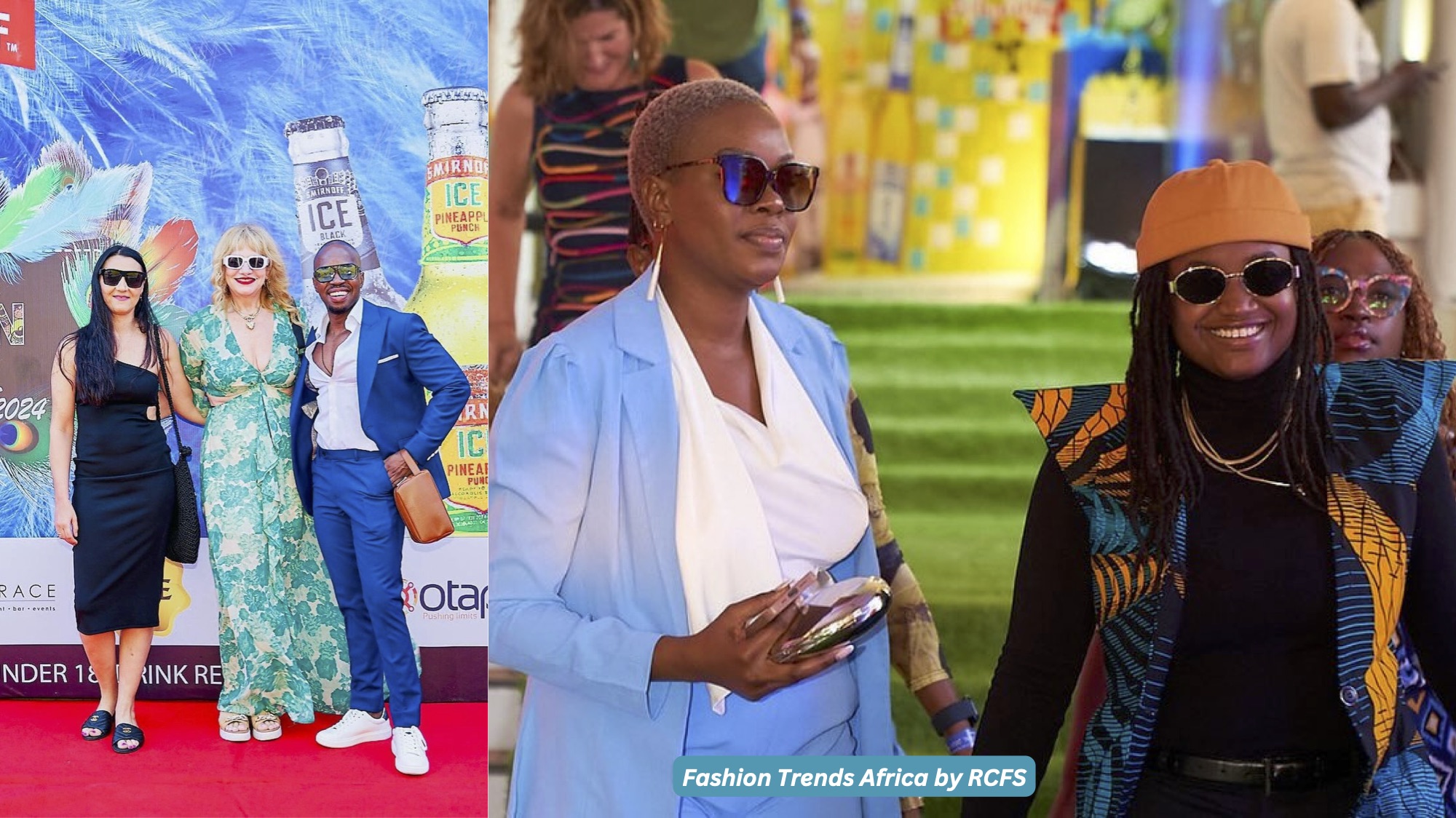 Audience members on the red carpet during the Tanzania Fashion Festival 2024 [Photo Credit: TFF]
Audience members on the red carpet during the Tanzania Fashion Festival 2024 [Photo Credit: TFF]
The centerpiece of the event was undoubtedly the breathtaking runway that stretched elegantly over the hotel's pool. This audacious design choice transformed the traditional catwalk into a floating spectacle, adding an element of drama and sophistication to the proceedings. Models glided gracefully above the water, their reflections shimmering beneath them, creating a mesmerizing visual effect that left the audience in awe.
 Tanzania Fashion Festival 2024 [Photo Credit: TFF]
Tanzania Fashion Festival 2024 [Photo Credit: TFF]
Smirnoff, the main sponsor of the event, ensured that guests were well-refreshed throughout the evening. Under the theme "Smirnoff's Night to Remember," attendees sipped on signature cocktails while enjoying the fashion extravaganza, further enhancing the festive atmosphere.
Deogratius Kithama, the founder of Tanzania Fashion Festival, expressed the event's core mission: "Our goal has always been to provide Tanzanian fashion craftsmen and women with a stage that would elevate their visibility on both national and international levels." This commitment to showcasing local talent was evident in the diverse array of designers featured at the festival.
 Tanzania Fashion Festival 2024 [Photo Credit: TFF]
Tanzania Fashion Festival 2024 [Photo Credit: TFF]
Over 20 talented designers brought their unique visions to life on the water-top runway. The collections ranged from avant-garde styles pushing the boundaries of conventional fashion to pieces that elegantly incorporated traditional Tanzanian elements. Each garment told a story, reflecting the rich cultural tapestry of Tanzania while embracing contemporary global trends.
 Tanzania Fashion Festival 2024 [Photo Credit: TFF]
Tanzania Fashion Festival 2024 [Photo Credit: TFF]
The models, adorned in stunning apparel and intricate ornaments, were the perfect canvas for these artistic creations. Their poise and grace as they navigated the floating runway added an extra layer of allure to the already captivating designs. The interplay between the flowing fabrics, the shimmering water below, and the ambient lighting created a truly magical atmosphere.
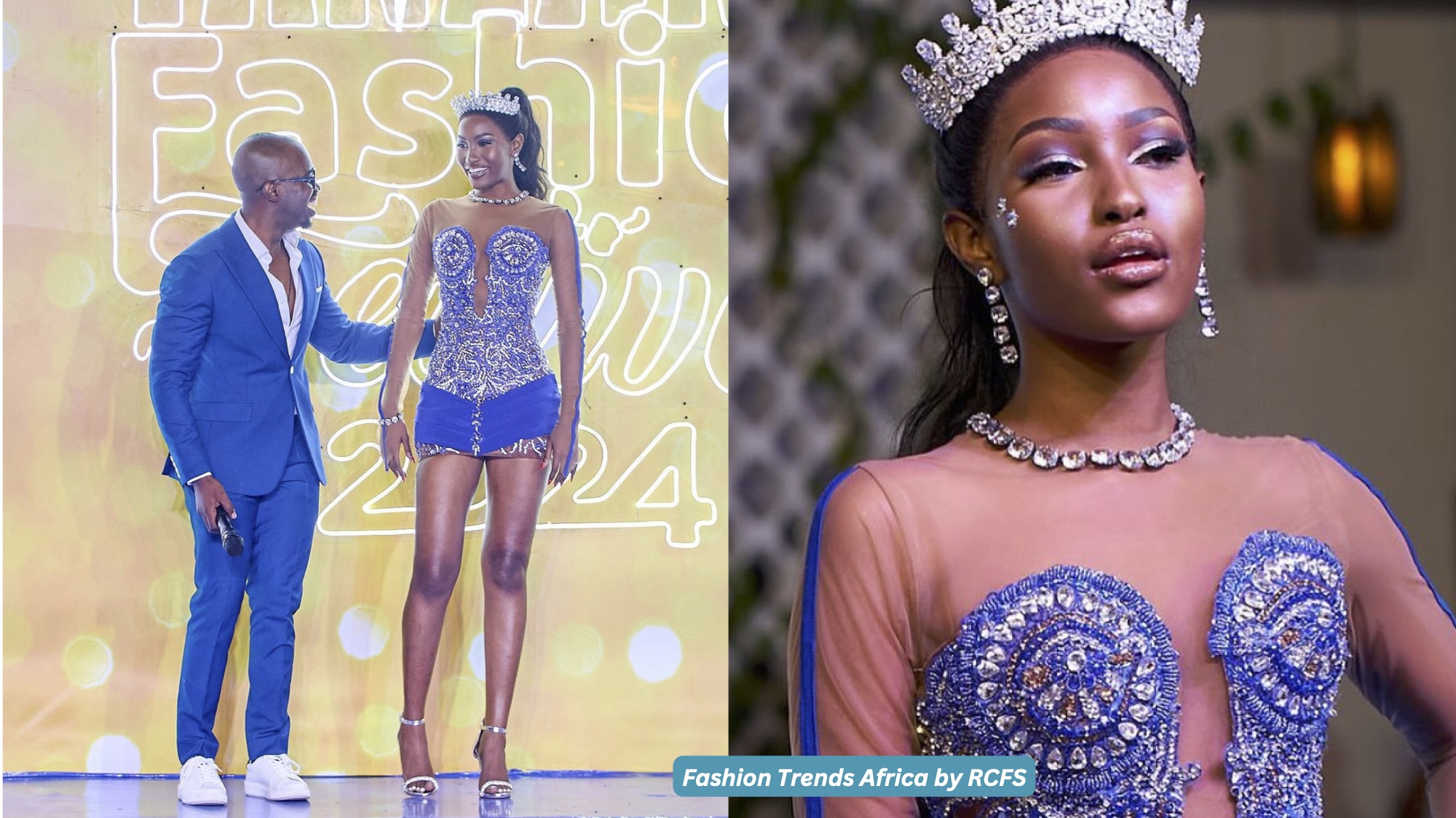 From left is Deogratius Kithama the founder of Tanzania Fashion Festival, and with Miss Tanzania 2023/2024 Tracy Nabukeera [Photo Credit: TFF]
From left is Deogratius Kithama the founder of Tanzania Fashion Festival, and with Miss Tanzania 2023/2024 Tracy Nabukeera [Photo Credit: TFF]
Among the standout collections were an array of beachwear and casual wear outfits, perfectly suited to Tanzania's tropical climate and laid-back lifestyle. Designers showcased innovative uses of local textiles, incorporating traditional patterns and motifs into modern, wearable pieces. The men's collections were equally impressive, featuring sharp tailoring and bold prints that challenged conventional menswear norms.

Adding to the evening's entertainment was a musical performance by Tanzanian singer Saraphina Michael, known professionally as Phina. Her energetic set provided a rhythmic backdrop to the fashion showcase, further highlighting the synergy between Tanzania's music and fashion scenes.
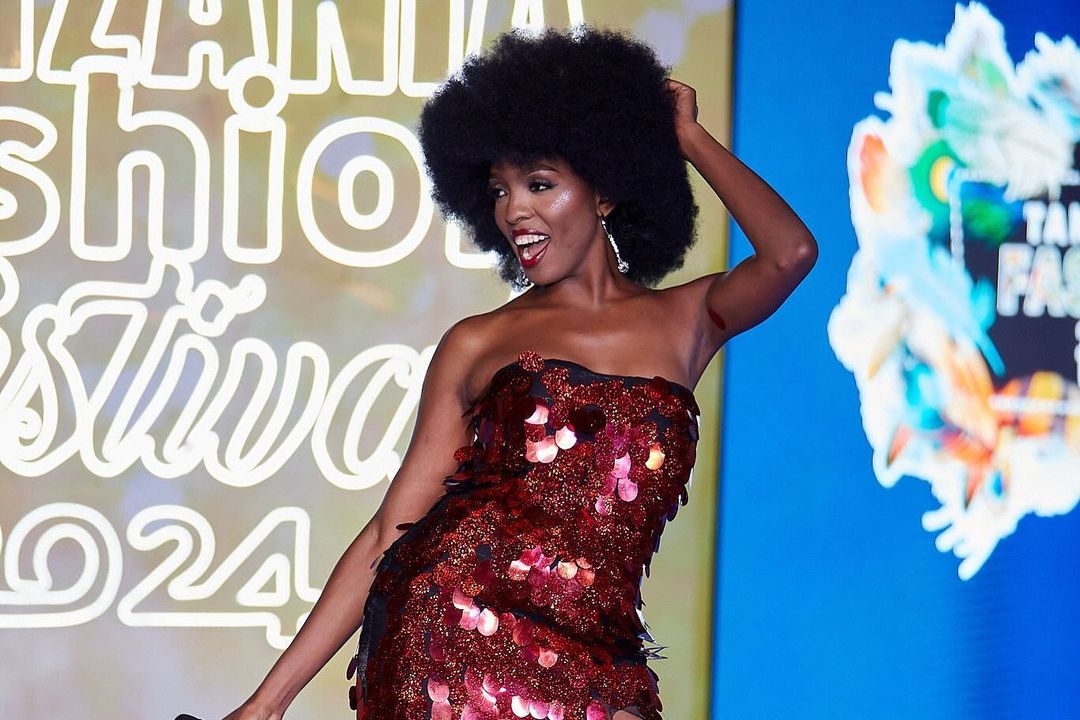 Tanzania Singer is known as PHINA during the Tanzania Fashion Festival 2024 [Photo Credit: TFF]
Tanzania Singer is known as PHINA during the Tanzania Fashion Festival 2024 [Photo Credit: TFF]
Now in its 7th edition since its founding in 2018, the Tanzania Fashion Festival has grown to become a highly anticipated event in East Africa's fashion calendar. This year's unique decorations, coupled with the floating runway concept, set a new standard for fashion events in the region.
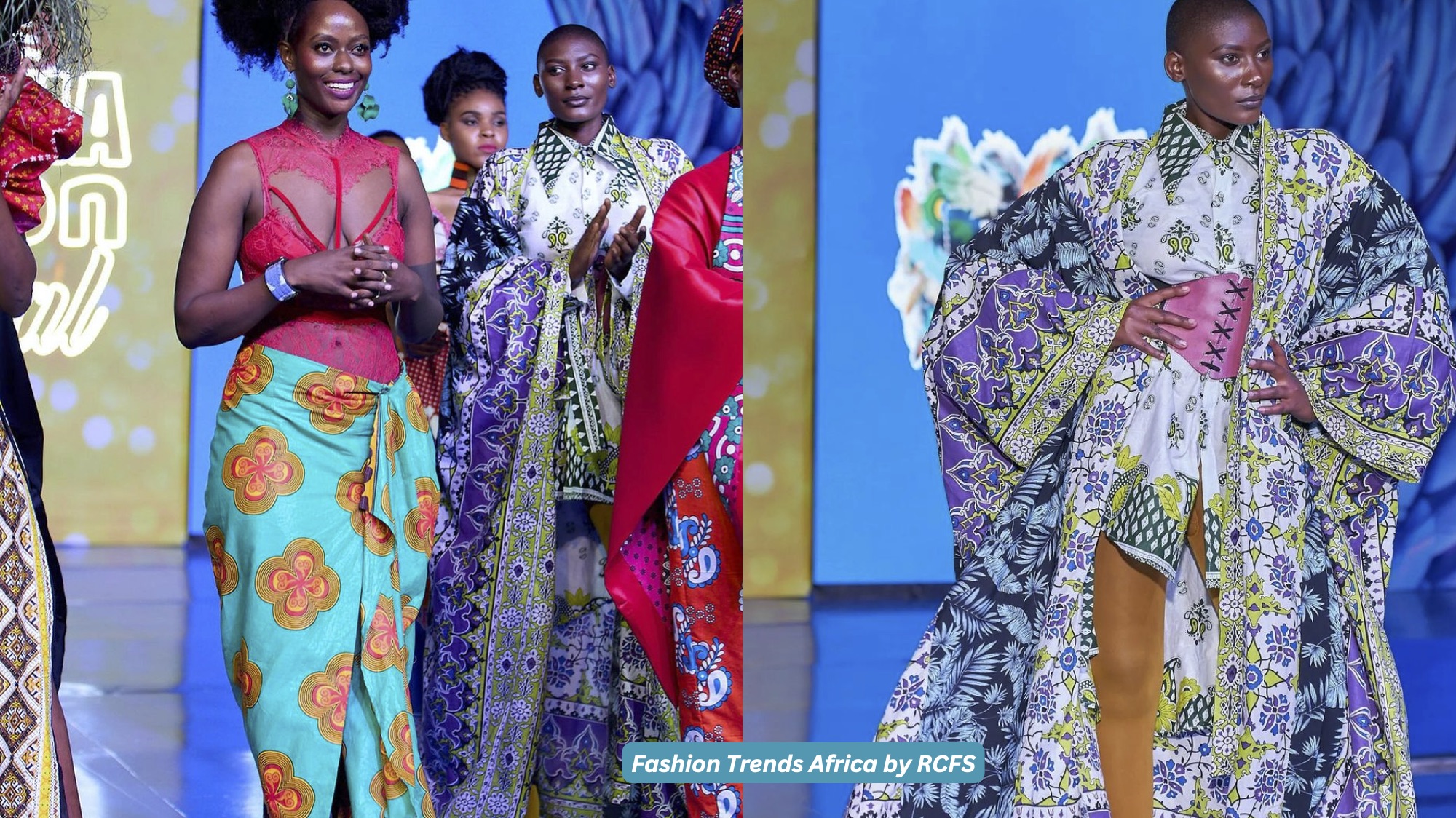 Tanzania Fashion Festival 2024 [Photo Credit: TFF]
Tanzania Fashion Festival 2024 [Photo Credit: TFF]
As the fashion industry in Tanzania continues to evolve and gain recognition, questions arise about the long-term impact of such events on the careers of models and designers. While the festival provides an invaluable platform for exposure, the challenge lies in translating this visibility into sustainable business opportunities and international recognition for Tanzania's fashion talent.
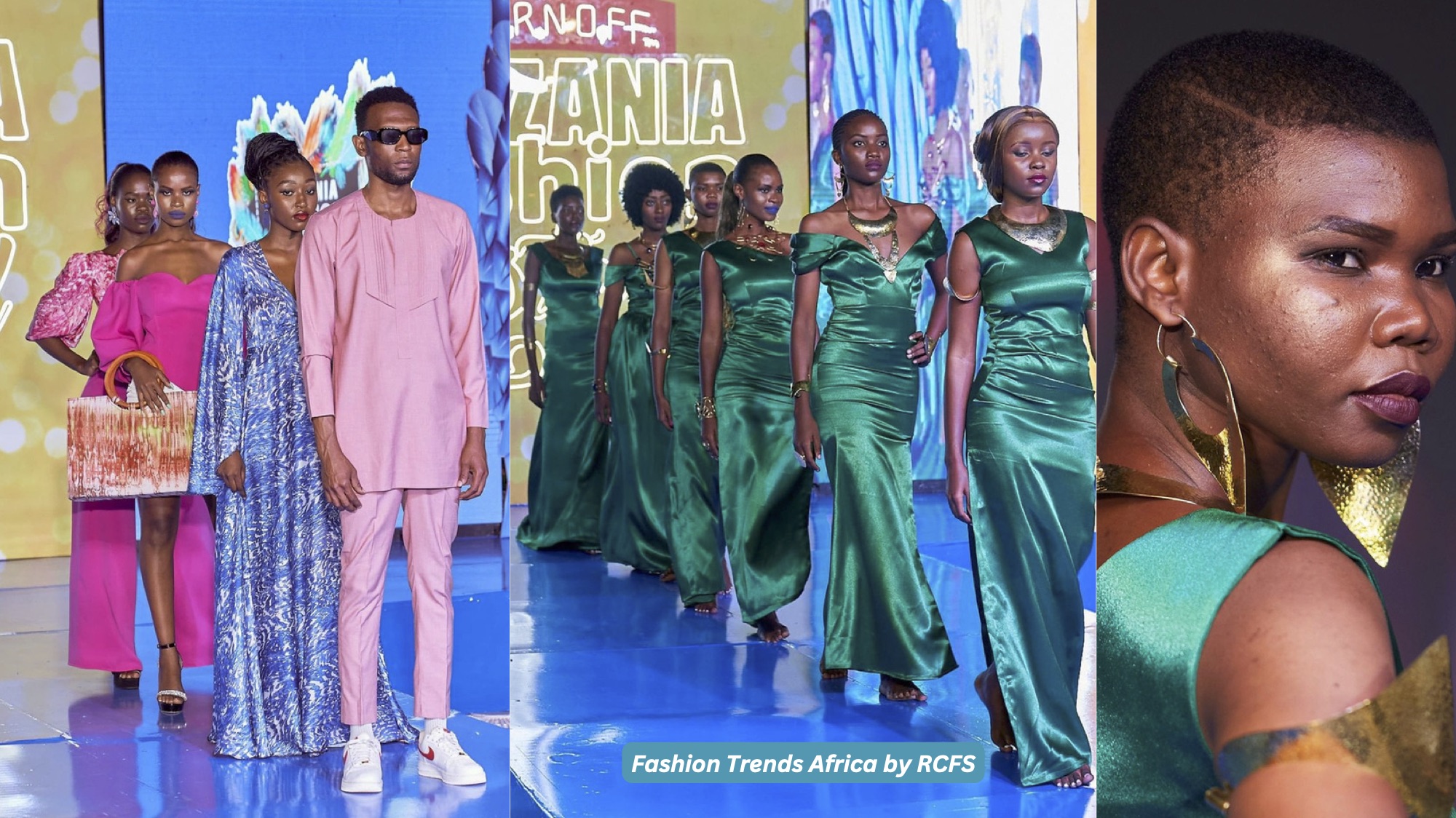 Tanzania Fashion Festival 2024 [Photo Credit: TFF]
Tanzania Fashion Festival 2024 [Photo Credit: TFF]
Looking ahead, the success of the Tanzania Fashion Festival 2024 points to a bright future for the country's fashion industry. By continuing to innovate and showcase the best of Tanzanian creativity, the festival is not just a celebration of style but a powerful tool for economic and cultural development. As the curtain falls on this year's event, fashion enthusiasts and industry insiders alike eagerly anticipate what next year's festival will bring to the ever-evolving landscape of East African fashion.
 Tanzania Fashion Festival 2024 [Photo Credit: TFF]
Tanzania Fashion Festival 2024 [Photo Credit: TFF]
 Tanzania Fashion Festival 2024 [Photo Credit: TFF]
Tanzania Fashion Festival 2024 [Photo Credit: TFF]
 Tanzania Fashion Festival 2024 [Photo Credit: TFF]
Tanzania Fashion Festival 2024 [Photo Credit: TFF]
 Tanzania Fashion Festival 2024 [Photo Credit: TFF]
Tanzania Fashion Festival 2024 [Photo Credit: TFF]
 Tanzania Fashion Festival 2024 [Photo Credit: TFF]
Tanzania Fashion Festival 2024 [Photo Credit: TFF]
The Tanzania Fashion Festival 2024: Runway Built on Water
The Tanzania Fashion Festival 2024 has reimagined the traditional fashion show concept with its latest event, held on Saturday, September 28, 2024, at the Terrace Hall in Slipway Hotel, Masaki, Dar es Salaam. This year's edition captivated attendees with its innovative approach, combining style, creativity, and a unique aquatic twist.
 Audience members during the Tanzania Fashion Festival 2024 [Photo Credit: TFF]
Audience members during the Tanzania Fashion Festival 2024 [Photo Credit: TFF]
As fashion enthusiasts arrived at the venue, they were greeted by a meticulously organized event. A red carpet stretched out before them, inviting guests to capture their glamorous moments with photos and selfies. The atmosphere buzzed with excitement, setting the stage for an unforgettable evening of fashion and creativity.
 Audience members on the red carpet during the Tanzania Fashion Festival 2024 [Photo Credit: TFF]
Audience members on the red carpet during the Tanzania Fashion Festival 2024 [Photo Credit: TFF]
The centerpiece of the event was undoubtedly the breathtaking runway that stretched elegantly over the hotel's pool. This audacious design choice transformed the traditional catwalk into a floating spectacle, adding an element of drama and sophistication to the proceedings. Models glided gracefully above the water, their reflections shimmering beneath them, creating a mesmerizing visual effect that left the audience in awe.
 Tanzania Fashion Festival 2024 [Photo Credit: TFF]
Tanzania Fashion Festival 2024 [Photo Credit: TFF]
Smirnoff, the main sponsor of the event, ensured that guests were well-refreshed throughout the evening. Under the theme "Smirnoff's Night to Remember," attendees sipped on signature cocktails while enjoying the fashion extravaganza, further enhancing the festive atmosphere.
Deogratius Kithama, the founder of Tanzania Fashion Festival, expressed the event's core mission: "Our goal has always been to provide Tanzanian fashion craftsmen and women with a stage that would elevate their visibility on both national and international levels." This commitment to showcasing local talent was evident in the diverse array of designers featured at the festival.
 Tanzania Fashion Festival 2024 [Photo Credit: TFF]
Tanzania Fashion Festival 2024 [Photo Credit: TFF]
Over 20 talented designers brought their unique visions to life on the water-top runway. The collections ranged from avant-garde styles pushing the boundaries of conventional fashion to pieces that elegantly incorporated traditional Tanzanian elements. Each garment told a story, reflecting the rich cultural tapestry of Tanzania while embracing contemporary global trends.
 Tanzania Fashion Festival 2024 [Photo Credit: TFF]
Tanzania Fashion Festival 2024 [Photo Credit: TFF]
The models, adorned in stunning apparel and intricate ornaments, were the perfect canvas for these artistic creations. Their poise and grace as they navigated the floating runway added an extra layer of allure to the already captivating designs. The interplay between the flowing fabrics, the shimmering water below, and the ambient lighting created a truly magical atmosphere.
 From left is Deogratius Kithama the founder of Tanzania Fashion Festival, and with Miss Tanzania 2023/2024 Tracy Nabukeera [Photo Credit: TFF]
From left is Deogratius Kithama the founder of Tanzania Fashion Festival, and with Miss Tanzania 2023/2024 Tracy Nabukeera [Photo Credit: TFF]
Among the standout collections were an array of beachwear and casual wear outfits, perfectly suited to Tanzania's tropical climate and laid-back lifestyle. Designers showcased innovative uses of local textiles, incorporating traditional patterns and motifs into modern, wearable pieces. The men's collections were equally impressive, featuring sharp tailoring and bold prints that challenged conventional menswear norms.

Adding to the evening's entertainment was a musical performance by Tanzanian singer Saraphina Michael, known professionally as Phina. Her energetic set provided a rhythmic backdrop to the fashion showcase, further highlighting the synergy between Tanzania's music and fashion scenes.
 Tanzania Singer is known as PHINA during the Tanzania Fashion Festival 2024 [Photo Credit: TFF]
Tanzania Singer is known as PHINA during the Tanzania Fashion Festival 2024 [Photo Credit: TFF]
Now in its 7th edition since its founding in 2018, the Tanzania Fashion Festival has grown to become a highly anticipated event in East Africa's fashion calendar. This year's unique decorations, coupled with the floating runway concept, set a new standard for fashion events in the region.
 Tanzania Fashion Festival 2024 [Photo Credit: TFF]
Tanzania Fashion Festival 2024 [Photo Credit: TFF]
As the fashion industry in Tanzania continues to evolve and gain recognition, questions arise about the long-term impact of such events on the careers of models and designers. While the festival provides an invaluable platform for exposure, the challenge lies in translating this visibility into sustainable business opportunities and international recognition for Tanzania's fashion talent.
 Tanzania Fashion Festival 2024 [Photo Credit: TFF]
Tanzania Fashion Festival 2024 [Photo Credit: TFF]
Looking ahead, the success of the Tanzania Fashion Festival 2024 points to a bright future for the country's fashion industry. By continuing to innovate and showcase the best of Tanzanian creativity, the festival is not just a celebration of style but a powerful tool for economic and cultural development. As the curtain falls on this year's event, fashion enthusiasts and industry insiders alike eagerly anticipate what next year's festival will bring to the ever-evolving landscape of East African fashion.
 Tanzania Fashion Festival 2024 [Photo Credit: TFF]
Tanzania Fashion Festival 2024 [Photo Credit: TFF]
 Tanzania Fashion Festival 2024 [Photo Credit: TFF]
Tanzania Fashion Festival 2024 [Photo Credit: TFF]
 Tanzania Fashion Festival 2024 [Photo Credit: TFF]
Tanzania Fashion Festival 2024 [Photo Credit: TFF]
 Tanzania Fashion Festival 2024 [Photo Credit: TFF]
Tanzania Fashion Festival 2024 [Photo Credit: TFF]
 Tanzania Fashion Festival 2024 [Photo Credit: TFF]
Tanzania Fashion Festival 2024 [Photo Credit: TFF]
Virtual Conference: THE STATE OF EAST AFRICAN FASHION AND SUSTAINABLE PRACTICES
 In the photo, these are shoes made by UZURI K & Y, made of recycled tires: UZURI K&Y is an African-inspired eco-friendly shoe brand that champions sustainability through its innovative use of the 4R technology: recycling, reusing, recovering, and reducing car tires to create eco-friendly footwear
In the photo, these are shoes made by UZURI K & Y, made of recycled tires: UZURI K&Y is an African-inspired eco-friendly shoe brand that champions sustainability through its innovative use of the 4R technology: recycling, reusing, recovering, and reducing car tires to create eco-friendly footwear
How far is the fashion industry in East Africa and how do fashion designers understand sustainable fashion?
Event Overview
Fashion Trends Africa by RCFS, represented by Celestin Ntawirema, presents a virtual conference focusing on the current state and future prospects of the East African fashion industry. This event will bring together fashion entrepreneurs, enthusiasts, and industry professionals for an insightful discussion on regional trends and sustainable practices. Attendees will have the opportunity to engage in live discussions, share their views on the topics presented, and ask questions directly to the guest speakers and moderators.
Guest Speakers:
- Wyne KIRABO
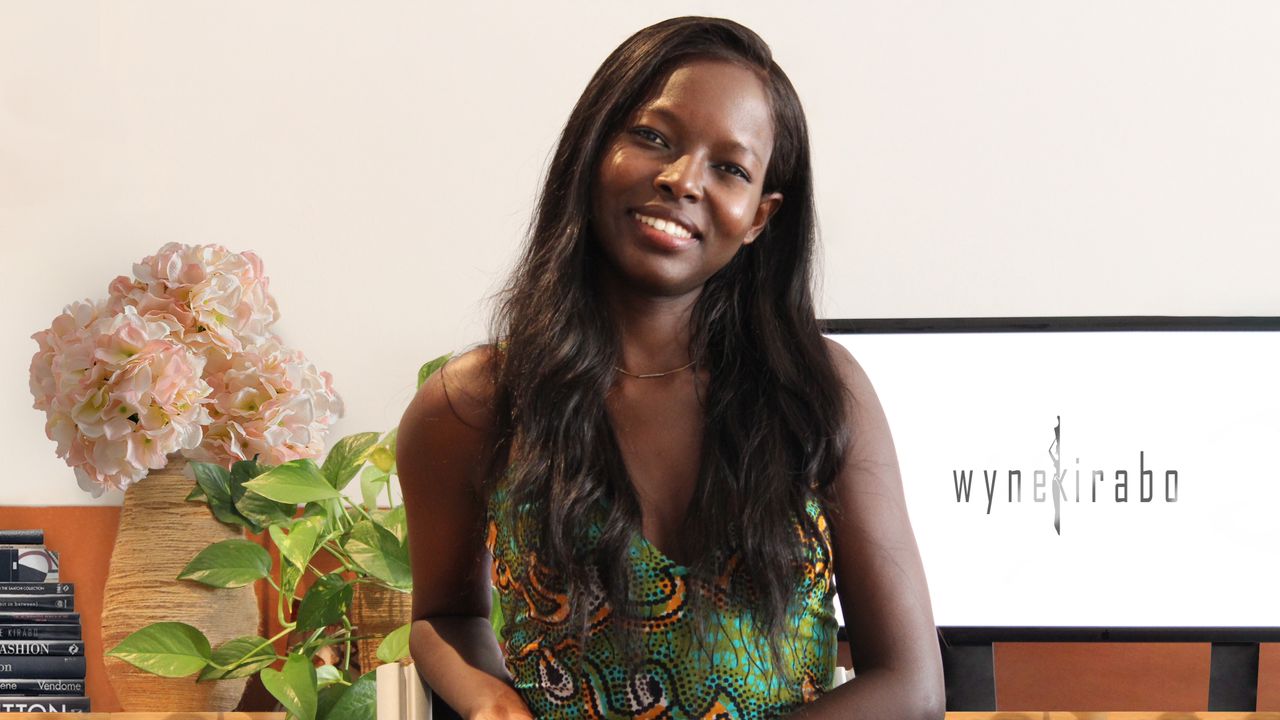
Ugandan fashion designer, winner of the Asfas award 2022 as Best Emerging African Designer , speaker at the Faculty of Economics of the University of Barcelona, included in the list of "20 young african creatives to know" according to the multiawarded The Africa Report, nominated in the TOP 40 UNDER 40 list of Uganda's leading English language newpaper, New Vision, member of the jury FDP University of Girona/Qstura, who has dressed Diarra Diouf, starring actress of the film "Érase una vez en Canarias", at the premiere in Madrid (Spain), the singer Afrika Bibang at the Spanish National Performing Arts Awards Max 2021, the painter Bianca Nguema at the UN minority awards, among other celebrities, and who has appeared in media such as Fashion United, TV3, Rtve, Urban TV, etc.More info here.
Wyne Kirabo was founded by Winnie Kirabo and Gerard Porta in 2019. The creative designer majored in fashion design, pattern making and tailoring at the University of Girona (Spain) after her diploma in MicroFinance from Kyambogo University (Uganda).
- Franco KABANO
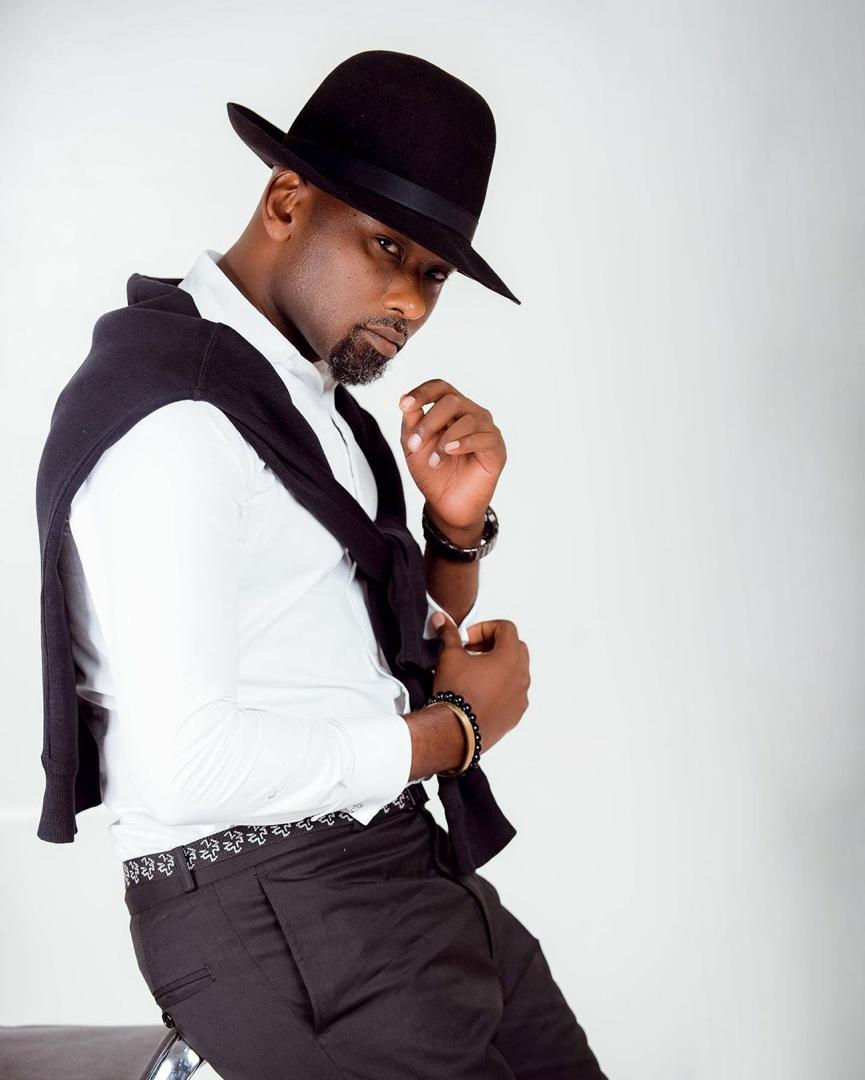
The founder and CEO of Webest Model Management and the founder & former President of Rwanda Fashion Models Union, has been in the industry for more than 10 years. He started modeling in 2004 but got on stage to model in 2006. However, the inconsistency in terms of fashion modeling gigs that he experienced, inspired him to think of ways to contribute to the modeling industry. In 2015, he set up a school of modeling to create a union that would bring all models together after I learned of the creation of the Rwanda Art Council at the Rwanda Academy of Languages and Culture.
Franco is the brain behind Rwanda Models Union which is a forum that brings Rwandan models together. He is also the founder and chairman of Webest Models Management a leading modeling agency in Rwanda that works with professional models. So far, the agency has promoted Rwandan models to take part in international fashion weeks such as London Fashion Week Paris Fashion, New York Fashion Week, and many others.
- Maximilien Kolbe HATEGEKIMANA
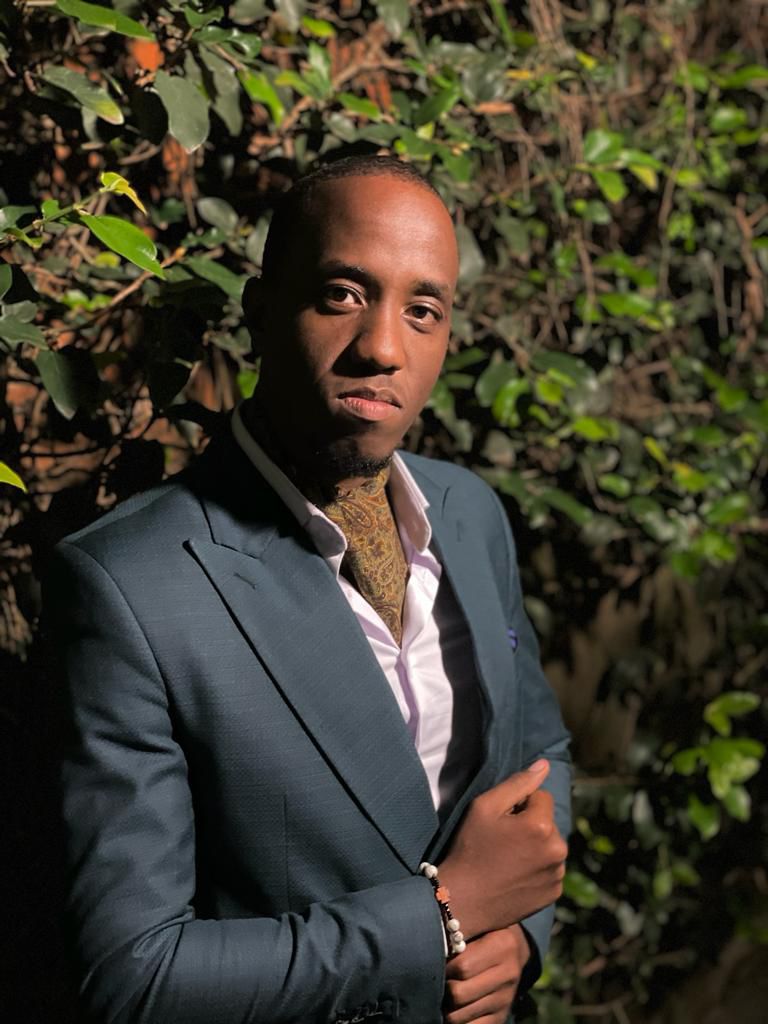
Maximilien Kolbe is a Rwandan fashion expert who specialize in education, trend forecasting, and circular economy with a proven track record working in the Rwandan fashion industry, dedicated to the elevation of the African fashion landscape and representing a new wave of African fashion creatives that is dispelling the image of poor quality and craftsmanship that is often associated with the continent.
He is a true grass to grace story working his way up from being a backpack clothes salesman to a fully-fledged businessman owning his own menswear brand, KOLBE. He built his experience gradually from fashion styling, sales and retailing of merchandise, and fashion designing to fashion consulting and now is a fashion researcher and now educator. Part of the team that developed the Rwandan TVET curriculum for Fashion design from level 1 to level 7.
He is the CO-CEO of Kuza Africa which is a community-driven hub in Kigali, dedicated to serving as a comprehensive resource center for "Made in Rwanda" creatives and fashion designers, offering unique workspaces and production capabilities. Starting by empowering their capacity and knowledge, and connecting them to opportunities.
- Moderator: Celestin Ntawirema

Celestin Ntawirema is a multifaceted creative professional from Rwanda, working as an artist, filmmaker, and journalist. With over a decade of experience in the fashion industry, Ntawirema has established himself as a prominent figure in promoting African fashion and entrepreneurship. Ntawirema is the founder of the Rwanda Cultural Fashion Show, an event that showcases the rich cultural heritage and contemporary designs of Rwanda.
He also created Fashion Trends Africa, a news website dedicated to promoting both local and international African fashion designers. Expanding his influence in the creative sphere, Ntawirema founded and hosts the Made in Africa podcast. This platform brings authentic stories of African entrepreneurs to a global audience, highlighting innovation and success across the continent.
Currently, Ntawirema is collaborating with East African fashion designers to explore the role of sustainable fashion in the region. His work focuses on understanding how designers can promote sustainability and involve local communities in the process. Through his various initiatives, Celestin Ntawirema continues to be a passionate advocate for Made in Africa products and talent, contributing significantly to the visibility and growth of African fashion and entrepreneurship on the world stage.
Conference Highlights
- In-depth analysis of the East African fashion industry's current status
- Exploration of sustainable fashion practices in the region
- Insights and advice for emerging designers
- Interactive Q&A session with participants
Target Audience
- Fashion entrepreneurs
- Designers (established and emerging)
- Fashion enthusiasts
- Industry professionals
- Students of fashion and related fields
Expected Outcomes
- Increased awareness of East African fashion trends
- Better understanding of sustainable practices in the industry
- Networking opportunities for participants
- Actionable insights for emerging designers
Key Details
- Date: October 16, 2024
- Time: 10:00 AM - 12:00 NOON (Kigali Time)
- Platform: Zoom and YouTube Live
- Admission: Free (Registration required)
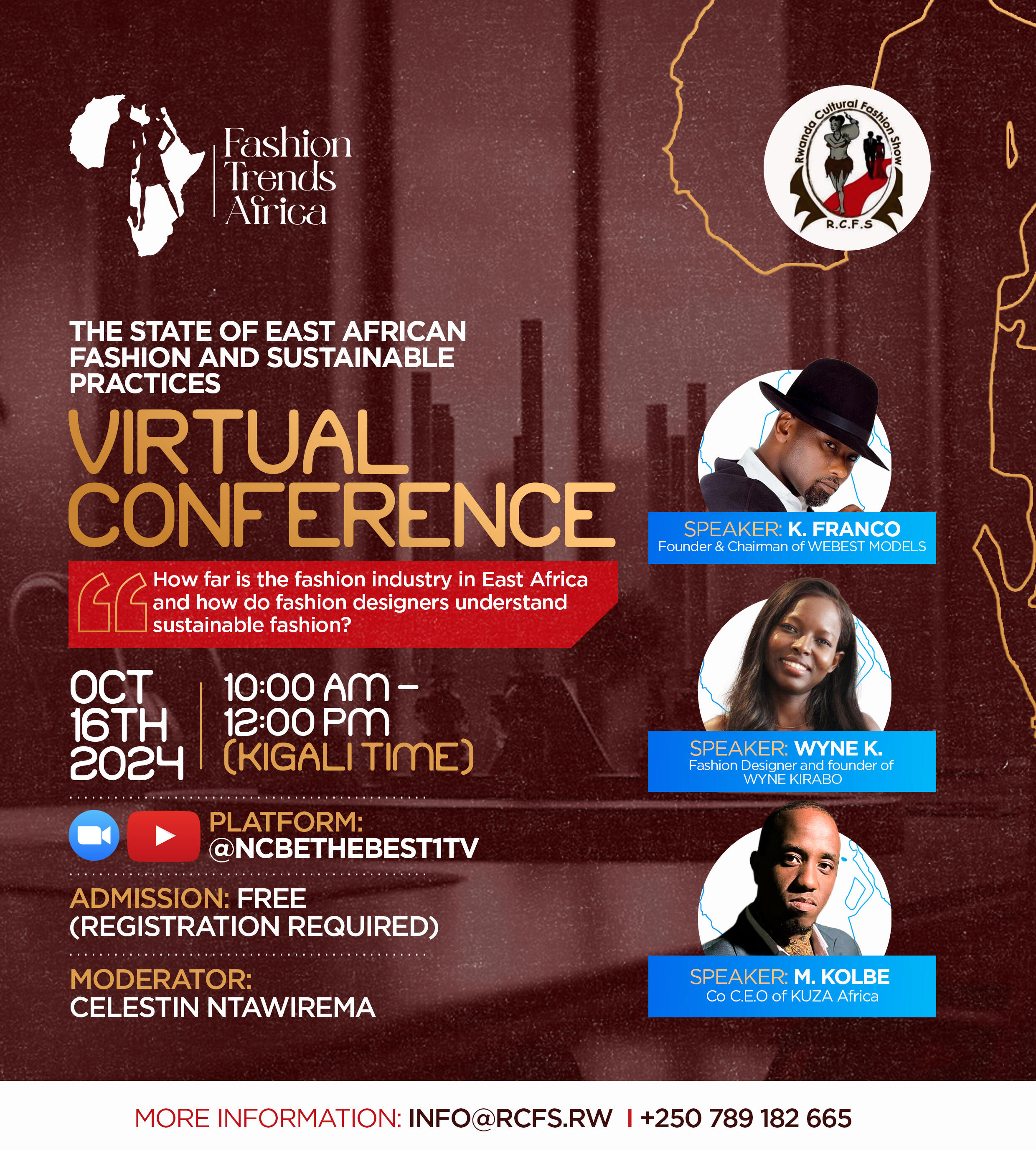
To register for this enlightening event, please visit [Registration ]. Join us in shaping the future of East African fashion. Contact us: This email address is being protected from spambots. You need JavaScript enabled to view it., WhatsApp: +250 789 182 665
LATEST NEWS
One week to go until Africa Sourcing and Fashion Week 2024: Designers, Exhibitors, and Speakers
01 November 2024 282 hitsOne week to go until Africa Sourcing and Fashion Week 2024: Designers, Exhibitors, and Speakers The countdown has begun for…
9 Years Milestone: Moses Turahirwa and His Moshions Brand Rwanda-Based
25 October 2024 434 hits9 Years Milestone: Moses Turahirwa and His Moshions Brand Rwanda-Based Over the past decade, Rwanda's fashion industry has emerged as…
What to Expect in Lagos Heineken Fashion Week 2024: Runways Kick off Today
23 October 2024 538 hitsWhat to Expect in Lagos Heineken Fashion Week 2024: Runways Kick Off Today The prestigious Heineken Lagos Fashion Week (LagosFW),…
Storytelling Meets High Fashion at The Kenya Fashion Story 2024
23 October 2024 625 hitsStorytelling Meets High Fashion at The Kenya Fashion Story 2024 The convergence of narrative and haute couture takes center stage…
Why Former Model Franco Kabano Is Backing the Stage Fashion Showcase's Founder
23 October 2024 537 hitsWhy Former Model Franco Kabano Is Backing the Stage Fashion Showcase's Founder In Rwanda's fashion industry, Franco Kabano and Sandrine…
The Stage Fashion Showcase 2024 Pre-Event Highlights Emerging and Established Talents: Main Event Set for November 1
20 October 2024 515 hitsThe Stage Fashion Showcase 2024 Pre-Event Highlights Emerging and Established Talents: Main Event Set for November 1 The fashion scene…
FASHION SHOPS
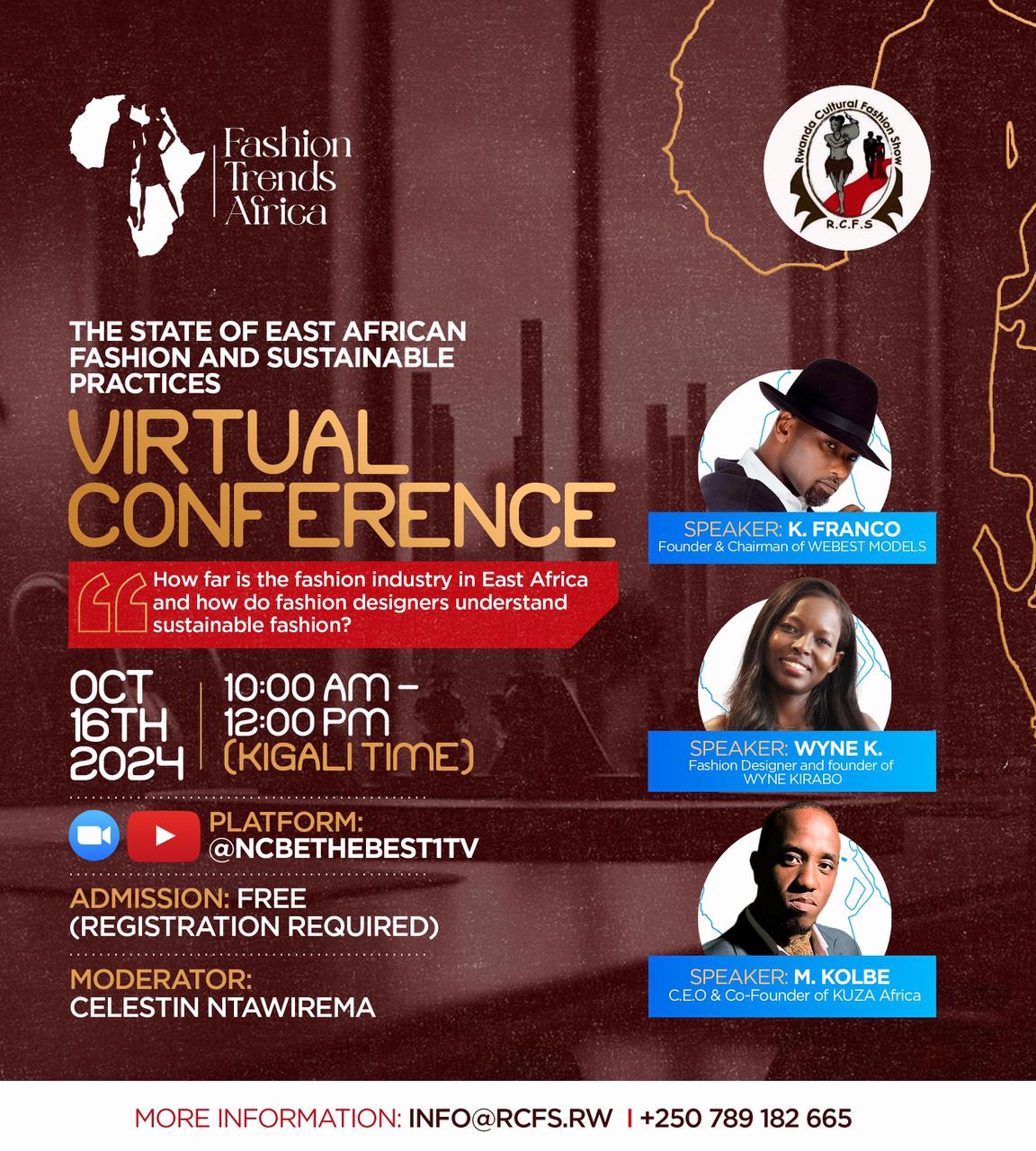



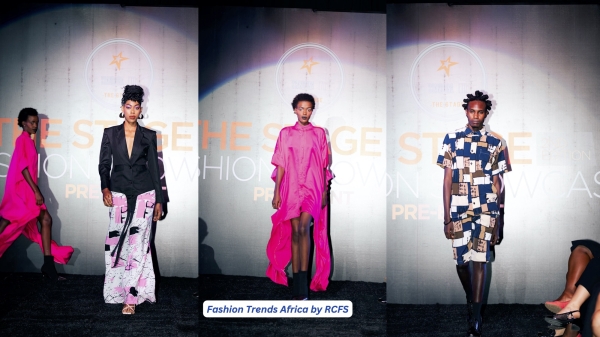
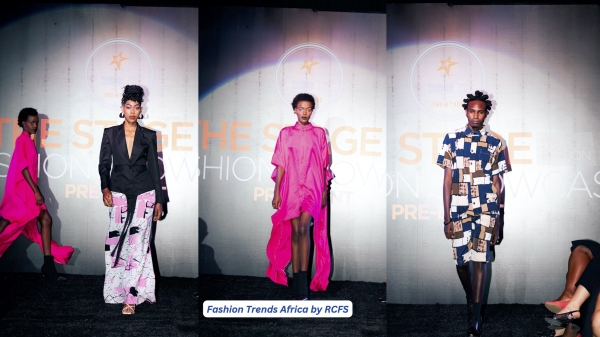
![From left is WYNE KIRABO Ugandan fashion designer based in Barcelona and Maximilien Kolbe from Rwanda, a fashion expert and founder of KOLBE brand [Photo Credit: WM]](/media/k2/items/cache/acaf69a47291143b36612c5b483fc572_Generic.jpg)
![From left is WYNE KIRABO Ugandan fashion designer based in Barcelona and Maximilien Kolbe from Rwanda, a fashion expert and founder of KOLBE brand [Photo Credit: WM]](/media/k2/items/cache/2ee6f501a6569cf213987ad1c50a88aa_Generic.jpg)
![The collections made out of the recycled fabrics [Photo Credit: IG]](/media/k2/items/cache/9feeafa8e740fdbe632b43236148b194_Generic.jpg)
![The collections made out of the recycled fabrics [Photo Credit: IG]](/media/k2/items/cache/b7e607e23f1646b9ce9f7d0da4fbe580_Generic.jpg)
![The collections made out of the recycled fabrics [Photo Credit: IG]](/media/k2/items/cache/2ec788b5d2483f73e1f9efd1de8baaf4_Generic.jpg)
![Tanzania Fashion Festival featured more than 15 fashion designers who showcased unique and quality designs [Photo Credit: TFF ]](/media/k2/items/cache/20e6d0dc79365d45f8620c21a172f633_Generic.jpg)
![Tanzania Fashion Festival featured more than 15 fashion designers who showcased unique and quality designs [Photo Credit: TFF ]](/media/k2/items/cache/c66733db6fd9c6779ab24f57f69f5201_Generic.jpg)
